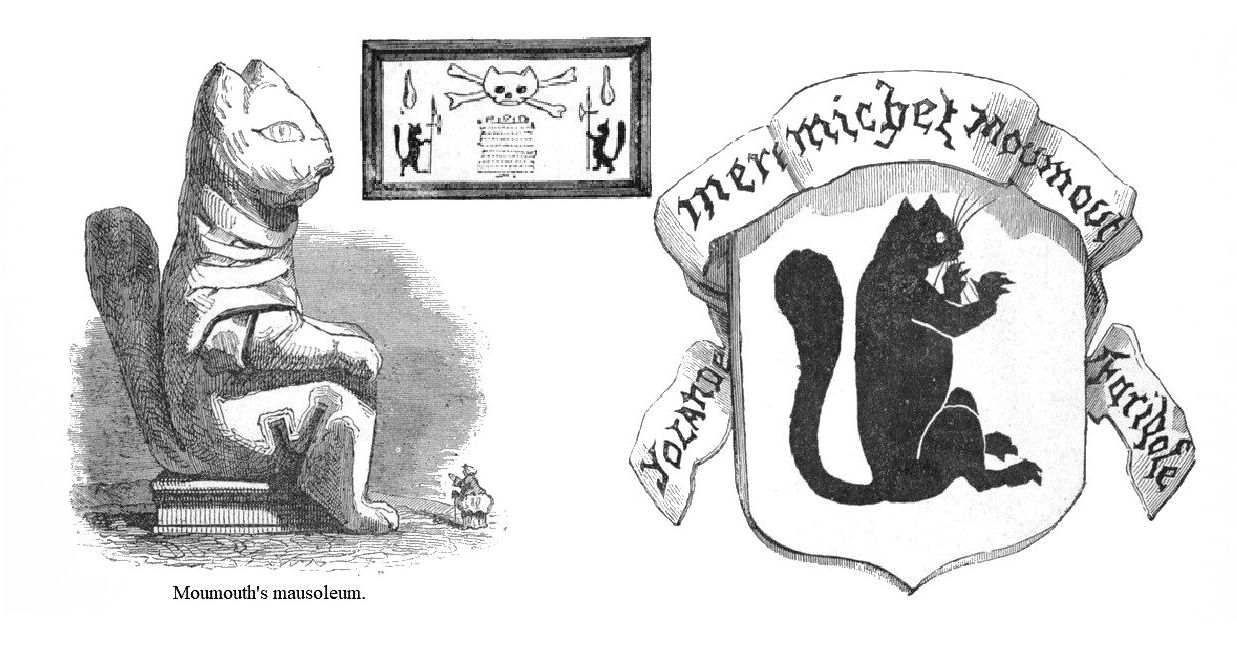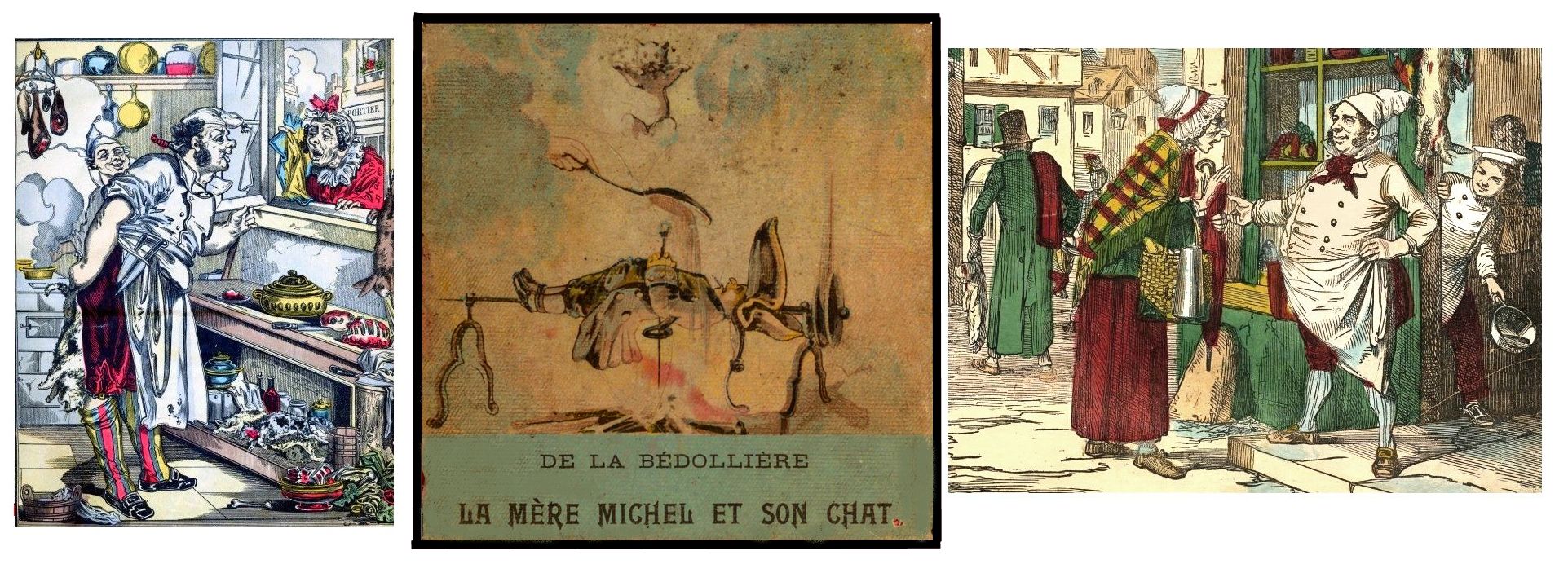
MOTHER MICHEL'S CAT

This is a French children's song/nursery rhyme popular in the 1820s and still popular today. Lustucru, derived from "L'eusses-tu-cru?", a 17th century phrase used by theatrical fools, which means "Would you have believed it?" As a character in French folklore, the villainous Lustucru began as a misogynist, later becoming the sadistic, cat-hater of the nursery rhyme.
Poor Mother Michel has lost her cat,
Shouts from the window "please give him back!".
Father Lustucru replied with a boast,
Oh! Mother Michel, your cat is not lost!
Poor Mother Michel then said to he:
If you've found my cat - return him to me!
To Mother Michel replied Lustucru:
For a reward, I'll return him to you.
Poor Mother Michel then told him this:
Give me my cat and I'll give you a kiss.
But Lustucru only wanted her gold -
Said: As a rabbit, your cat has been sold!
In 1845, the writer Emile de la Bedolliere wrote "The Story of Mother Michel and her Cat," inspired by the characters in the nursery rhyme. In his story, Moumouth the cat belongs to the Countess de la Grenouillère. She entrusts Moumouth to her Lady-in-Waiting, Mother Michel, but her animal-haiting butler, Lustucru, repeatedly tries to get rid of it.
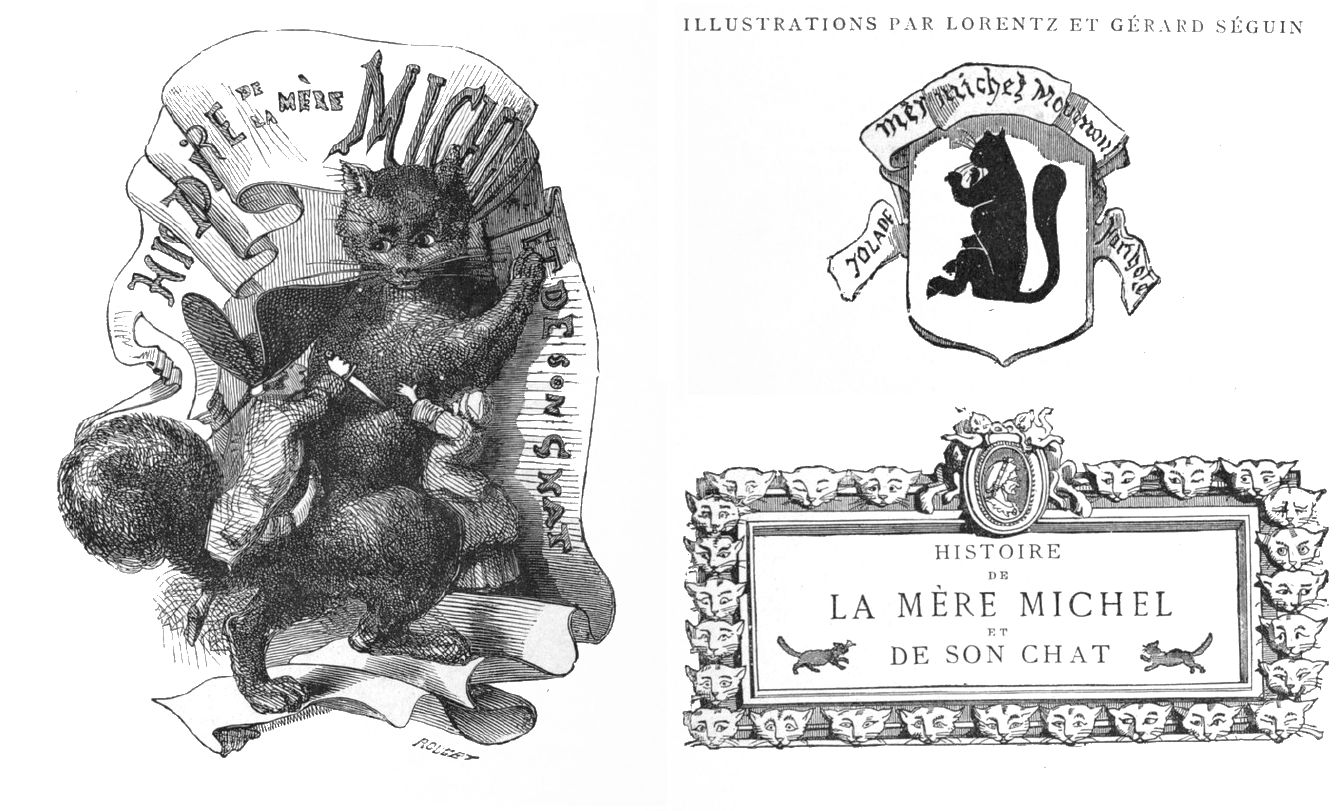
THE STORY OF MOTHER MICHEL AND HER CAT
CHAPTER I - HOW MOTHER MICHEL MET HER CAT.
In Paris, during the reign of the late King Louis XV, that is during the 1700s, there lived an elderly Duchess named Yolande Frogpond. Duchess Frogpond was a most respectable lady who had land and riches and who willingly distributed alms to the poor of the parish of Saint-Germain-l'Auxerrois, and to those in other districts. Her husband, Eustace Jeremy Laroche, Duke Frogpond, had died gloriously at the Battle of Fontenoy on May 11, 1745. The noble widow had mourned him for a long time, and still mourned him several times a week. Childless and reclusive, she had succumbed to a strange obsession, which in no way, it is true, detracted from her real virtues and her eminent qualities: she had a passion for animals, albeit an unfortunate passion, since all of her pets had died in her arms. The first of her beloved pets had been a green parrot which, having unwisely eaten parsley, a deadly poison to his kind, had succumbed to terrible and fatal colic. Indigestion from eating too many crunchy biscuits had deprived Madame Frogpond of a very promising pug. The third of her favorites, a monkey from the interesting family of marmosets, broke his chain one evening and went exploring among the trees in the garden, where he was caught in a downpour and contracted a fatal head cold.
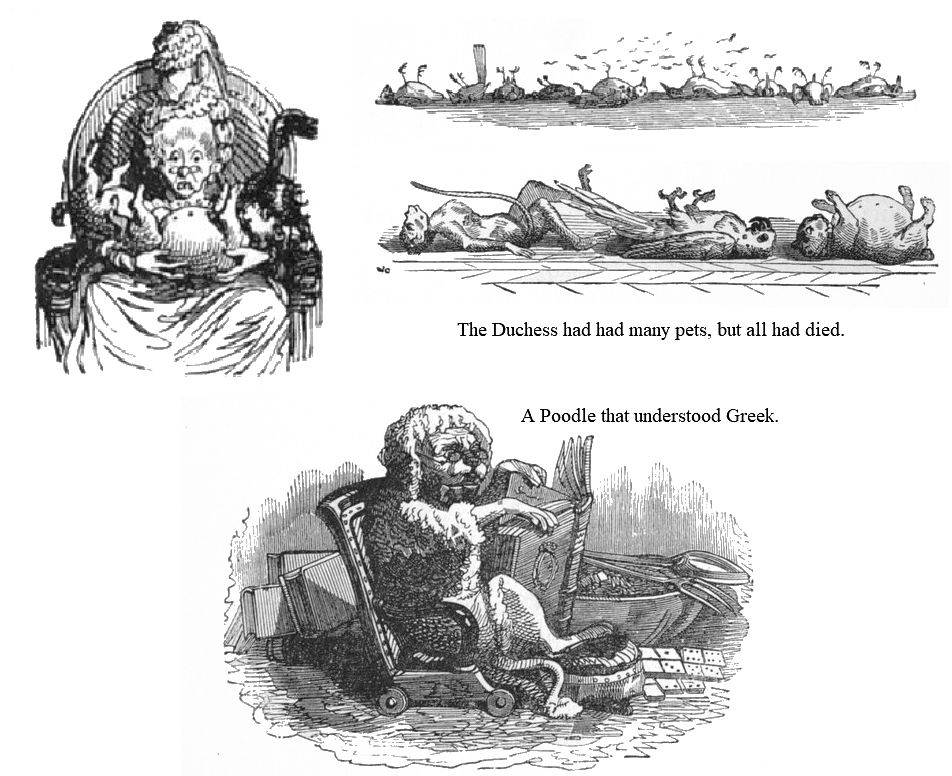
The Duchess subsequently had birds of various species, but some had flown away and others had died of thirst. Overwhelmed by so many disasters, she shed many tears. Her friends, seeing her inconsolable, offered her a succession of animals: squirrels, clever canaries, white mice, and cockatoos; but she didn't want to know. She even refused a beautiful poodle that played dominoes, danced the gavotte, ate salad and understood Greek.
"No, no," said the Duchess, "I don't want any more animals in my house; the air in my house is fatal to them," for she had ended up believing in fate.
One day, as she was leaving the church, a group of children ran past her, jostling each other and laughing joyfully. Seated in her carriage, she could see over the throng, and discovered the cause of their merriment was a poor tomcat to whose tail some malicious person had tied a saucepan. The unfortunate cat had no doubt been running for a long time trying to escape the saucepan, and he looked overwhelmed by fatigue. Seeing that the poor cat was slowing down, his persecutors formed a circle around him and began to throw stones at him. The unfortunate cat bowed its head; certain of being surrounded only by enemies, he resigned himself to his sad fate with the heroism of a Roman senator. Several projectiles had already hit him when Madame Frogpond, seized with deep compassion, got out of her carriage, pushed through the throng and exclaimed: "I will give a gold sovereign to whoever who saves this animal!"
Her words produced an almost magical effect; they transformed the executioners into liberators; the cat was almost suffocated by those who vied for the honour of delivering him safe and sound. Finally a sort of Hercules defeated his rivals, seized the cat and presented it half-dead to the Duchess.
"That's good," she said, "here, my good man, here is the promised reward." She gave him a brand new gold sovereign, fresh from the mint, then said "Relieve this poor animal of its inconvenient burden."
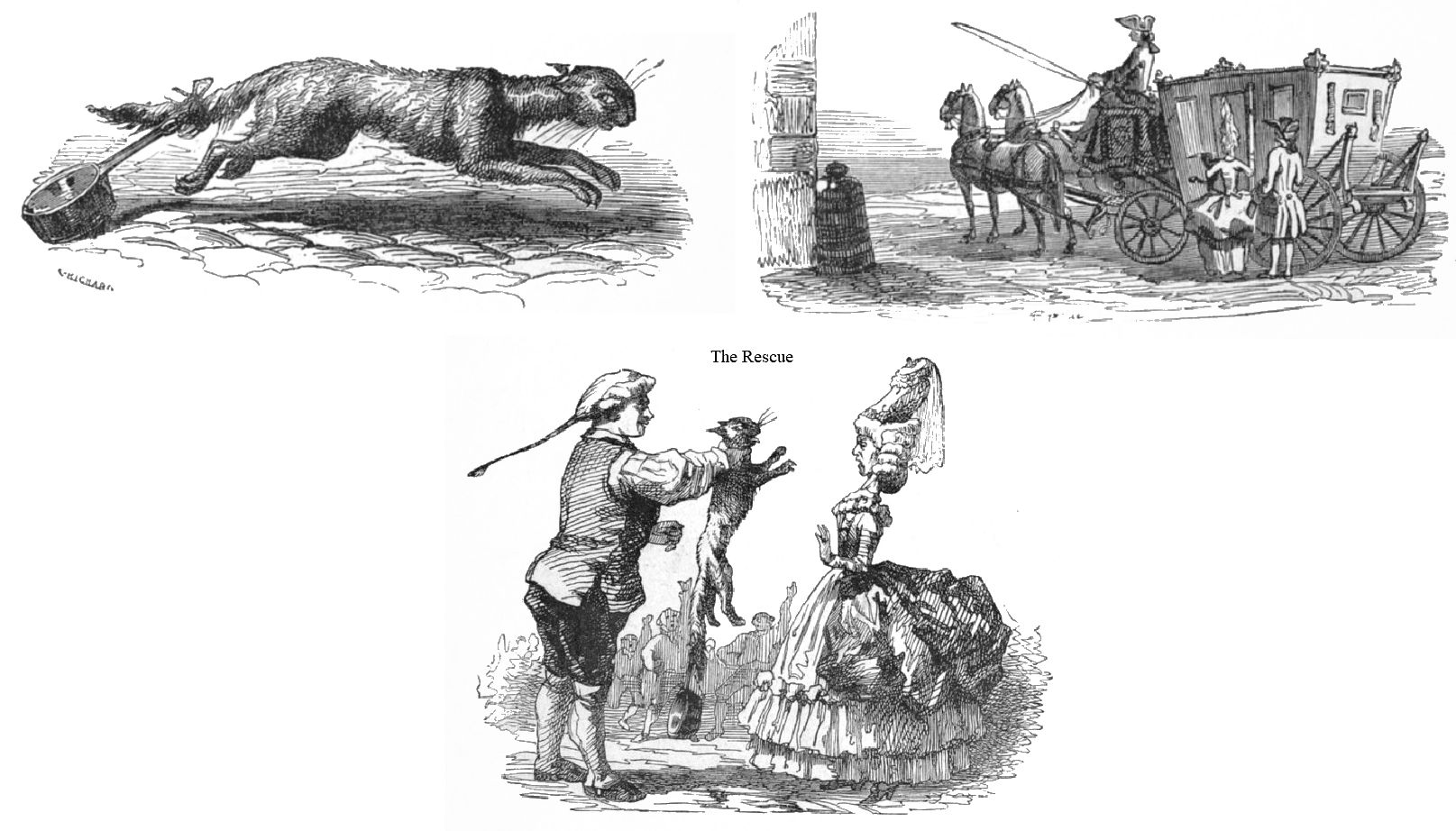
While this veritable Hercules obeyed, Madame Frogpond looked at the creature whose life she had just saved. He was the epitome of an alley cat, and his natural ugliness was increased by the accidents of his long, haphazard, headlong run. His short fur was soiled with mud; one could barely distinguish, through the various speckles, his grey fur streaked with black. He was so thin you could almost see through him, so skinny that you could count his backbones, so weak that a mouse would have killed him; in fact, he had only one thing in his favous, and that was his expression.
"My goodness he's ugly!" exclaimed Madame Frogpond with conviction, when she'd finished examining him.
As she got back into her carriage, the cat fixed his huge sea-green eyes on her, and gave her a strange, indefinable look, a look at once full of recognition and reproach, and so expressive that the good lady was suddenly fascinated. In his gaze she read a speech of prodigious eloquence:
"You gave in to a generous impulse, you saw me weak, suffering, oppressed, and you took pity on me. Now that your benevolence is satisfied, you look at me and my deformity inspires contempt in you! I thought you were good, but you are not good; you have the instinct for kindness, but you do not have goodness. If you were truly charitable, you would continue to be interested in me because of this, even though I am ugly; you would think that my misfortunes are due to my ugliness. When you leave me here in the street, at the mercy of the wicked, mu ugliness will produce the same effects. Leave, don't be proud of your incomplete beneficence! You haven't done me any favours, all you've done is prolong my suffering. I am an outcast, the whole world rejects me, I am condemned to die. May my destiny be fulfilled."
Madame Frogpond was moved to tears by this wordless speech. This cat seemed superhuman to her, or rather - since it was a cat - it seemed superanimal to her. She thought about the mysteries of the transmigration of souls and imagined that this cat, before assuming its present feline form, had once been a great orator and a good man. She said to her Lady-in-Waiting, Mother Michel, who had remained in the carriage:
"Take this cat, and take it away with you."
"What? Are you keeping him, mistress?" replied Mother Michel.
"Of course! As long as I live this animal will have a place at my fire and my table. If you wish to please me, treat him with as much zeal and affection as you treat me."
"Of course, mistress, I will do as you wish."
"Wonderful, wonderful; now let's get back home."
CHAPTER II - HOW THE CAT WAS INSTALLED IN MADAME FROGPOND'S MANSION AND ENTRUSTED TO THE CARE OF MOTHER MICHEL.
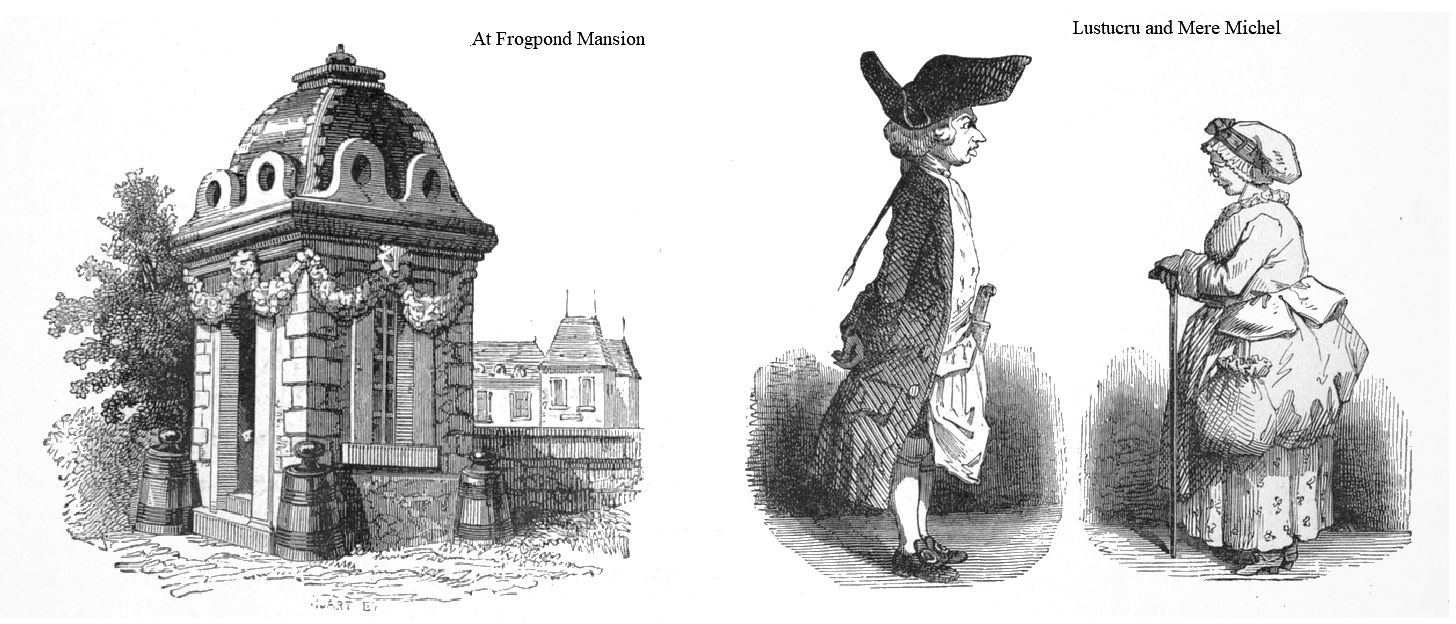
Madame Frogpond lived in a magnificent mansion on the corner of rue Saint-Thomas du Louvre and rue des Orties-Saint-Louis. She lived there in retirement, in the manner of the patriarchs, in an almost intimate friendship with her two main servants: Mrs. Michel, her trusted Lady-in-Waiting, and Mr. Lustucru, her butler. These servants were fairly advanced in age, so the Duchess, who had a sense of humour, named them Mother Michel and Father Lustucru.
Mother Michel's face expressed the best of feelings; but as much as she showed frankness and openness, Father Lustucru took great care to conceal the depths of his thoughts. The butler's clumsy demeanour could deceive inexperienced people, but under the mask of that false good nature, keen observers easily discovered the most perverse inclinations. There was duplicity in his big blue eyes, concentrated anger in his nostrils, cunning in the tip of his slender nose, and malice in the contours of his lips. Outwardly, he never neglected an appearance of honour. He knew how to maintain an appearance of probity while laboriously hiding the darkness of his soul. His wickedness was like a bomb whose fuse has not yet been lit, it was waiting for an opportunity to burst out.
Lustucru hated animals as much as his mistress loved them, but to flatter his mistress's inclinations, he pretended to idolize them. Seeing Mother Michel arrive with the rescued cat in her arms, he said to himself: "Not another beast! as if there weren't enough of us in the house!" He could not help but give the newcomer a glance of antipathy, then, immediately censoring himself, he exclaimed with feigned admiration: "Ah! the beautiful cat! The pretty cat! This cat has no equal!" and he caressed it in the most perfidious way.
" Really!" said Duchess Frogpond, "you don't find him too ugly?
" Too ugly! How can he be too ugly? He has charming eyes! But even if he was terribly ugly, you have taken an interest in him, you will transformed him!"
"I didn't like him at first."
"Those we dislike at first glance are the ones we later come to love the most," Father Lustucru remarked in a sententious tone.
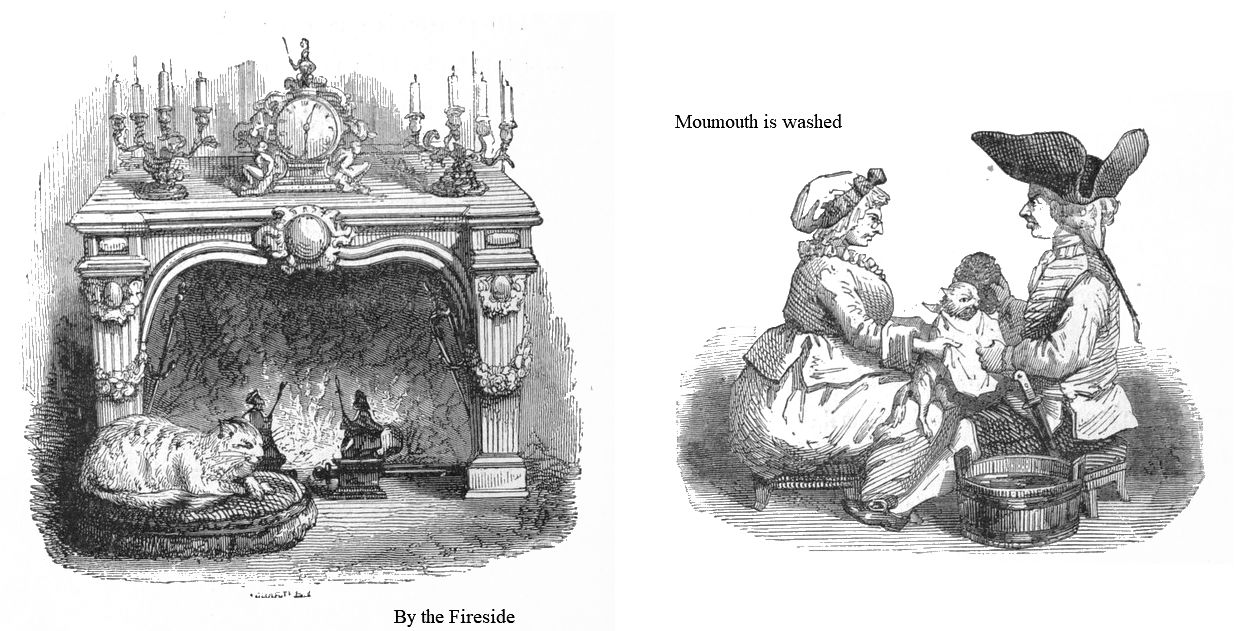
They immediately proceeded to wash the cat, who, despite his instinctive horror of water, endured the ablutions with touching resignation; he seemed to guess that it beautified him. After serving him a meal of leftovers, which he devoured eagerly, everything that was related to him was settled: his mealtimes, his daily schedule, his living quarters. They also thought about giving him a name. Mother Michel and Father Lustucru proposed several fairly good choices, such as Mistigris, Tristapatte, Ratapon, Rodilardus; but the Duchess rejected each in succession. She wanted a name that recalled the circumstances in which the cat had been found. An old scholar, whom she consulted the next day, suggested the name Moumouth, composed of two Hebrew words that meant "saved from the pans."
After a few days, Moumouth was unrecognizable: his fur had been carefully polished; succulent food had rounded out his form; his whiskers stood out like those of a seventeenth-century braggart; his eyes shone like emeralds; in fact he was living proof of the influence of welfare on the improvement of races. He owed his good looks mainly to Mother Michel, to whom he had expressed affectionate gratitude. On the other hand, he had a very pronounced aversion to Father Lustucru. As if he had guessed that he was dealing with an enemy, he refused the food presented to him by the butler, and apart from that, he saw him very little.
Moumouth's days were happy, everything seemed to promise a happy future; but, like the sword of Damocles, sorrow always hangs over the heads of men and cats. On January 24, 1753, there was an unusual sadness in Moumouth; he barely responded to the caresses lavished on him by Duchess Frogpond; he did not eat, and he spent the day crouching in the corner of the hearth, staring at the fire with a dull and lugubrious gaze. He had a presentiment of misfortune, and this misfortune came to pass. In the evening, a courier sent from the Gingeole Castle, in Normandy, brought the Duchess a letter, in which her younger sister wrote that she had fallen from her carriage and broken her leg. She begged the Duchess, her only relative, to come to her as quickly as possible. Duchess Frogpond was too sensitive and too caring to hesitate for a single moment.
"I will leave tomorrow," she said.
At these words, Moumouth, who was following his benefactress with his eyes, uttered a melancholy meow.
"Poor cat!" replied the Duchess, touched, "I will have to be parted from you for a while! I can't take you with me, because my sister has the fault of hating cats - she believes cats are treacherous! What slander! When she was a child she was stroking a young cat which was so over-stimulated by her affections that it accidentally scratched her. Was this perfidy? Of course not! It was sensitivity, but since that day, my sister has sworn eternal hatred to cats!"
Moumouth looked at his mistress with an expression which meant: "Madame, at least you do us justice, you are truly a superior woman!"
After a moment of silence and contemplation, the Duchess added: "Mother Michel, I am entrusting my cat to you."
"We will take good care of him, mistress," interrupted Father Lustucru.
"Don't worry about him, please," interrupted the Duchess. "You know that he has taken a dislike to you, that your mere presence irritates him. I don't know why, but ultimately he can't bear you."
"It's true," said Father Lustucru contritely, "he is unfriendly, though I love him, but he doesn't love me."
"My sister is unfair too. Maybe cats like her, though she doesn't like cats. I respect her opinion, and you must respect Moumouth's." After pronouncing these words in a firm tone, Duchess Frogpond addressed her pet's guardian: "Mother Michel, I entrust him to you alone. Return him to me safe and sound, and I will shower you with blessings. I am sixty-five years old, and you are ten younger, it is likely that you will outlive me."
"Oh! Mistress, why are you having such sad ideas?" exclaimed Mother Michel.
"Let me finish. In foresight of possible misfortune, I had already made plans to ensure you a peaceful existence, but if you keep Moumouth safe for me, I will also give you a pension of fifteen hundred Touraine pounds.
"Mistress!" said Mother Michel, her voice filled with conviction, "there's no point offering me a reward for my services - I love your cat with all my heart, and will always be devoted to him."
"I am convinced of it, and I will know how to reward your zeal."
During this conference, Father Lustucru used all his willpower to hide his jealous looks. He said to himself: "She gets everything and I get nothing! Fifteen hundred pounds a year is a fortune, and she'll get it all. Well I'll see that she doesn't get it!"
The next morning, at half past seven, four frisky horses were harnessed to the post-chaise which was to take the excellent dowager Duchess to Normandy. She said a final farewell to her favourite, pressed him to her heart, and got into the carriage. Until then Moumouth had only felt vague misgivings, but at that moment, he understood everything! He saw his benefactress ready to leave and, trembling at losing her, he rushed to her side.

"You must stay here," said Duchess Frogpond, trying to hold back her tears. But would you believe it? the cat was crying too!
To shorten that painful scene, Mother Michel grabbed the cat by the shoulders and tore it from the cushion of the carriage, to which it was clinging. The carriage door closed, the horses gave a vigorous nod and set off at an average speed of three leagues an hour. Moumouth twisted around in a final convulsion, then he fainted.
Duchess Frogpond, her head leaning out of the post-chaise, waved her handkerchief and cried out "Mother Michel, I recommend my cat to you!"
"Don't worry, mistress, I swear you will come home to find him big and fat."
"And I . . ." whispered Father Lustucru in a sepulchral voice, "I swear he will die!"
CHAPTERIII. - THE GOODNESS OF MOTHER MICHEL AND THE VILLAINY OF FATHER LUSTUCRU ARE REVEALED.
Mother Michel, well worthy of the trust shown to her, showed true maternal tenderness for Moumouth. She looked after him, pampered him, and cared for him so well that he became one of the most beautiful cats in the neighbourhood of the Louvre, where the cats were nevertheless magnificent. She constantly watched over him, served him the best dishes, put him to bed on the softest quilts. Fearing that he might one day be indisposed, she wanted to know all the diseases to which cats are usually subject, and obtained various works on this important subject; she even pushed her devotion so far as to read the "History of Cats," by Francois-Auguste-Paradis de Moncrif, a member of the French Academy.
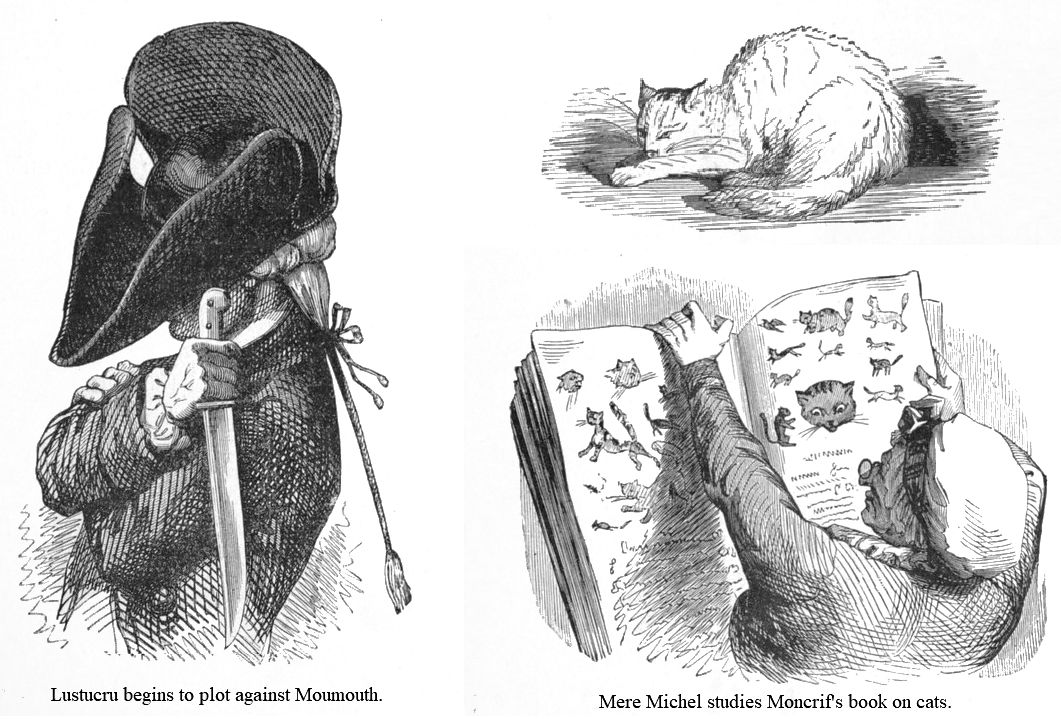
Mother Michel's actions was not motivated by the base interest of financial reward. That good old lady barely thought of herself. She was content with little and would always have enough to live on. For herself she wanted only a small room, good brown bread, firewood during the winter, and a spinning wheel for spinning wool, but she had nephews, nieces and godchildren, to whom she hoped to do good, and it was to them that she already planned to give Duchess Frogpond's gifts. However, the ever-increasing prosperity of Moumouth exasperated Father Lustucru. He saw with a sort of terror the hour approaching when the cat's faithful guardian would be rewarded; he constantly dreamed of the means of losing the cat, of stealing her four-legged ward from her, of drawing the wrath of their mistress upon her. By dint of maintaining his hatred and envy through solitary reflection, he no longer shrank from the prospect of a crime.
"How," he said, "can I purge this house of that miserable cat? What weapons can I use against him? Iron, poison, or water? I will use water!" he decided.
This resolution made, his only thoughts were of carrying it out. It was difficult to get hold of Moumouth, whom Mother Michel rarely let out of her sight, and who, not having the slightest confidence in the butler, was constantly on the defensive. Lustucru waited for several days for a favourable opportunity. One evening, after an excellent meal, Moumouth curled up near the fire in the living room, at the feet of Mother Michel, and slept the sleep of the righteous as he digested it. Meanwhile, Father Lustucru entered the room.
" Good! he said, "the cat is sleeping, now let's get his guardian away"
"How kind of you to come and keep me company!" said Mother Michel courteously; "Are you well this evening?"
"Perfectly," replied Father Lustucru, "but not everyone is as lucky as me. Our porter, for example, is in a deplorable state; he suffers excessively from his rheumatism, and would be very happy to see you for a moment. You always have good words to comfort the afflicted and excellent recipes to heal them. You should pay a little visit to our friend Krautman; I am convinced that your presence will cheer him up."
Mother Michel immediately got up and went down to the porter, who was experiencing violent rheumatic pains.
"It's just us now!" cried Father Lustucru, gleefully.
He crept into the anteroom, walking on tiptoe, and took a covered basket that he had hidden at the bottom of a cupboard. Then he returned to Moumouth, whom he suddenly grabbed by the neck. The unfortunate cat, waking with a start, found himself suspended in mid-air, face to face with his enemy, Father Lustucru. In this horrible situation, he wanted to scream, to struggle, to call for help, but he didn't have time. The odious butler plunged the poor cat into the basket, tightly secured the lid, and quickly reached the stairs, his eyes wild and his hair standing on end like a man committing a crime.
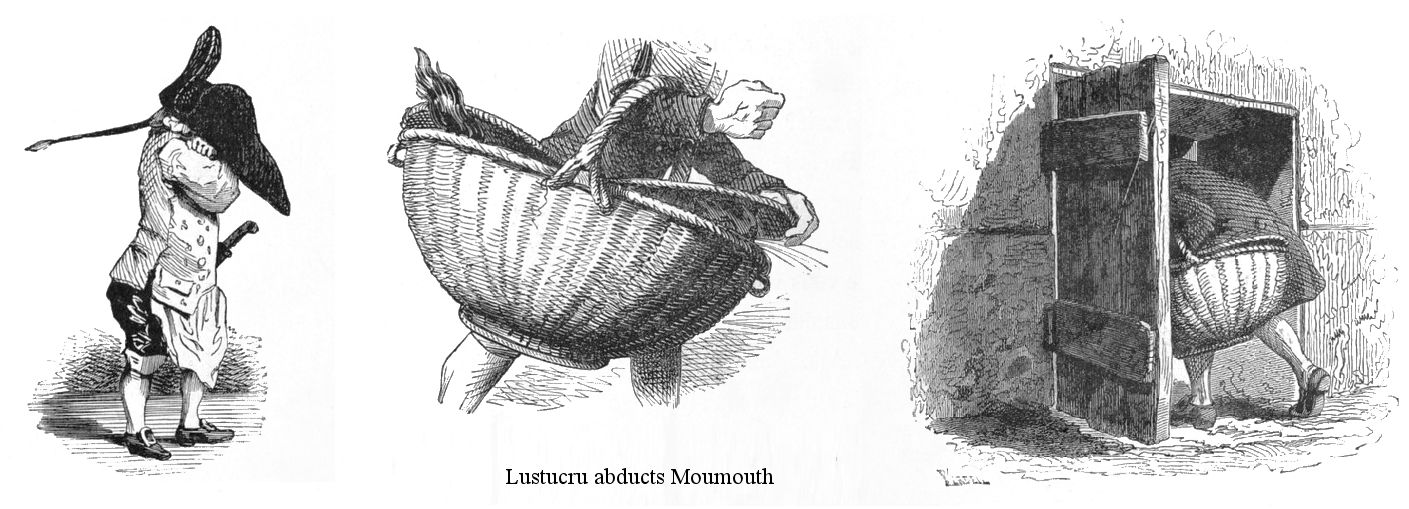
It was a beautiful February night: the sky was clear, it was cold and dry, the moon shone brightly, but at intervals large clouds hid its face and made the darkness complete. Father Lustucru crossed the mansion garden to exit through a small door for which he had obtained the key; he slipped from building to building, taking care to follow the paths only when the darkness favoured him. He had half-opened the small door when he heard a loud noise of footsteps and voices outside; startled he froze and listened.
"What nonsense!" he said after a moment of silent observation, "I had forgotten that it is the carnival - those are masqueraders going past!"
It was, in fact a group of masqueraders coming from the Palais-Royal. Lustucru waited until they were gone, then he hastily exited; as soon as he was on the street, in his joy of having succeeded, he began to whistle a gavotte tune while tapping out entrechats. His transports were reminiscent of cannibals dancing around their victim. He went up the Seine to the Notre-Dame bridge, stopped in the middle, extended the basket over the parapet andsuddenly turned it upside down, throwing the unfortunate Moumouth into the icy waters of the river below. The cat, as it fell through the air, cried out in an almost human voice. The assassin shuddered, but his emotion was short-lived, and, putting his hands in his pockets, he said in mocking tone:
"Safe journey, dear Moumouth, have a good trip! But, if I think about it," he added, "cats know how to swim and that bandit is capable of getting itself out of trouble! Ah well, it's a long way from the Notre-Dame bridge to rue Saint-Thomas du Louvre!"
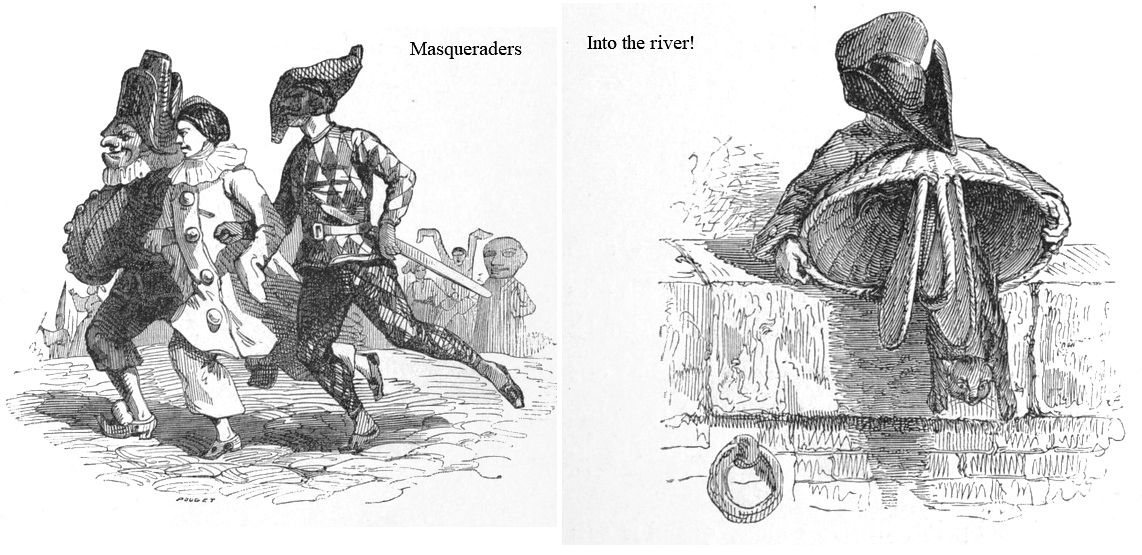
Reassured by this reflection, Lustucru continued on his way, returning through the garden door and cautiously going up to his room where he waited in ambush, ready to enjoy the lamentations of Mother Michel. She had lingered with the porter and had come out to give her cat the cup of sweet milk that she served him every evening. She went up to the living room with measured steps, calm and not foreseeing any catastrophe. When she saw that Moumouth was no longer in the place she had left him, she simply thought he had snuggled himself behind the sofa cushions, then she searched high and low, looking under the other pieces of furniture before she ran up the stairs calling: "Moumouth! Moumouth!"
"He isn't answering me," she said; "but when I went downstairs, Lustucru was with him. Perhaps he will give me some news." She immediately knocked on the door of the butler, who seemed to have awakened from a deep sleep, and who asked in a gruff tone what was wanted of him.
"Is Moumouth here?"
"Does your cat ever come to my home? You know very well he can't stand me. "
"Alas! where is he? I left it him the living room beside the fire, and now I can't find him!"
"Could he be lost?" said Father Lustucru, feigning the greatest anxiety.
"Lost? No! That's impossible! He must be in some corner of the house."
"Well, we must look for him," said the deceitful Lustucru gravely, "we must look for him this very moment. Moumouth is a precious beast who deserves to have the servants awakened for him."
All the inhabitants of the mansion were pressed into service. They were all equipped with a candle, and they searched the nooks and crannies, from cellar to attic, from courtyard to garden while Lustucru directed operations with apparent zeal. After fruitless searches, a devastated Mother Michel, exhausted with emotion and fatigue, threw herself into an armchair.
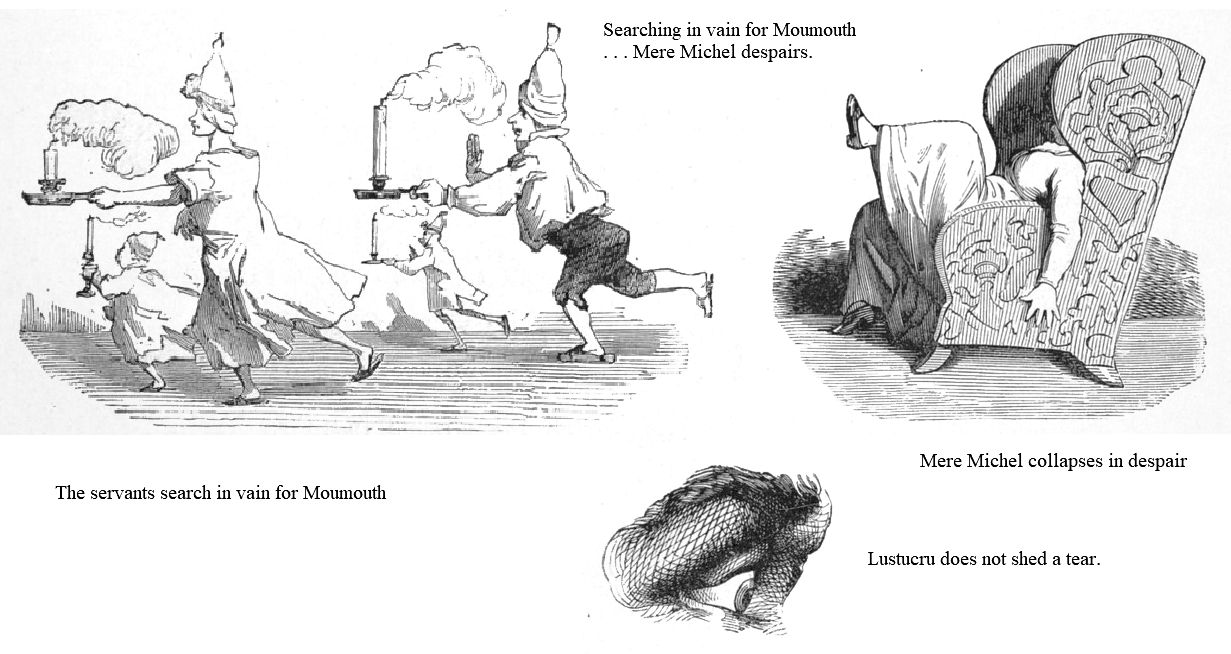
"Alas!" she said, "I left him for only a moment, and it was for a good deed. "
"I am beginning to believe that your cat is definitely lost," replied Lustucru in a severe tone; "It's a great misfortune for you! What will Duchess Frogpond say when she returns? She could throw you out!"
"Throw me out?" cried Mother Michel, suddenly drawing herself up to her full height before collapsing in on herself. Her face turned pale, her eyes closed, and she fell down, unconscious.
Father Lustucru looked at her with dry eyes, not feeling the slightest pang of remorse. He was laughing, the villain!
CHAPTER IV. - MOTHER MICHEL'S CAT DISPLAYS INTELLIGENCE BEYOND HIS NATURE, AND SHOWS HIMSELF STRONG IN ADVERSITY.
We have lost sight of Moumouth at the moment, and the last we saw of him he had been thrown from the top of the Notre-Dame bridge and was struggling in the waves. Luckily for him, the pillars of the main arch had a fairly wide edge, which he was able to cling to. From there he looked around. It seemed to him a boundless ocean and that it was beyond his strength to cross it. Rather than looking for shores that seemed to him to flee before him, he preferred to stay where he was, albeit at the risk of perishing there from hunger or cold, or of being carried away by a wave. At first he meowed as a sign of distress, but soon, believing himself to be helplessly lost, he decided it was useless to strain his chest so he awaited events with the resignation that was the basis of his character.
Around five o'clock in the morning, two pensioners from the island of Saint-Louis, great fishing enthusiasts, arrived to cast their long lines from the top of Pout Notre-Dame.
"You're early, Neighbor Guignolet," said the one who had arrived last; "it seems we've both had the same idea?
"And we did well," Neighbor Croquemouche, "there was a flood last night and the fish are coming down in droves from the upper Seine - you'd have to be horribly clumsy not to catch them."
"Would you like to make an arrangement, Neighbor Guignolet? We could fish together, share the spoils, and have lunch together today."
"Done!" said Mr. Guignolet. And, as both held their lines with their right hands, they struck each other's left hands in order to seal the agreement.
Moumouth, on seeing the two fishing-lines lines descend, felt his hopes rise. As soon as they were within his reach, he clung to them, and the fishermen, feeling an unusual weight, immediately shouted "I've got bite! I've got a bite!" and hurriedly pulled in their lines.

"I bet I've caught a barbel," cried Mr. Guignolet, who regretted he was unable to rub his hands together to show his satisfaction.
"I must have a big carp," replied Mr. Croquemouche, but barely had he finished his sentence when Moumouth jumped onto the parapet.
"Treachery!" cried the two fishermen, and they set off in pursuit of the quadruped who had so miraculously emerged from the waters, but Moumouth ran faster than either of them and escaped his pursuers without difficulty. As soon as he was alone, he took a breath, examined the houses and, not finding any that resembled his own, he naturally concluded that his home wasn't there. However, he needed a place to stay; shivering with cold and panting from exertion, he could not stay in the street another minute without risking a chest inflammation. Guided by the light of an oven, he entered the warm underground workshop of a baker, hid behind a pile of bread baskets, and dozed peacefully there. Eventually, he was awakened by hunger.
Moumouth had been born to poor parents who had abandoned him from his earliest childhood. He had been raised on the streets, forced to provide for himself, and trained in the school of misfortune he was a master of the art of catching rats and mice: a useful art, too often neglected by house-cats. He set himself on the lookout and surprised a mouse that had come out of its hole to eat the flour; he rushed towards the imprudent creature describing what geometers call a parabolic arc, and bit its muzzle to prevent it from screaming. This hunt, although conducted with skill and in silence, attracted the attention of a young baker's apprentice.
"Hey, a cat?" cried the apprentice, arming himself with the shovel used to take bread from the oven.
The master baker looked towards Moumouth, saw him busy eating the mouse, and said to the young apprentice "Don't hurt him - you can see that he is doing us a service."
"But where the hell did it come from?"
"What does it matter to you? He could be useful here," replied the baker, who was a fairly enlightened man and had studied his humanities to the fourth grade. "Eat, eat, my friend," he continued, bending down to gently caress Moumouth, "eat as many mice as possible, there will always be too more!"
Our cat took advantage of the permission granted to him. After having eaten his fill of mice, he wanted to go out to look for Frogpond House; but the baker blocked his way.

"One moment!" he said. "I needed a good cat, heaven sent him to me, and I would not forgive myself for letting him escape. Hey! Jacques, carefully close all the openings, and if this fellow looks like he's about to run away, give him three or four good blows with the broom."
Thus Moumouth's host became a tyrant; so true is it that personal interest underemines the best natures! Our cat, as if he had understood what was happening, jumped without hesitation onto the apprentice's shoulders, and from there onto the public highway. A new danger awaited him there. Surprised by the cat's unexpected appearance, an enormous bulldog stopped in front of him. Moumouth much preferred to avoid a struggle where he was clearly at a disadvantage, but the dog followed him with his eyes, not missing a single movement, going to the right when Moumouth went to the right, to the left when Moumouth went to the left, and constantly growling in a threatening manner. Both stood for a moment observing the other: the bulldog, its paws outstretched, its teeth clenched, its body pulled back; the cat, its mouth open, its back bristling, its head lowered and leaning forward. Neither seemed inclined to initiate hostilities. Finally, the dog rushed at his adversary, but Moumouth skilfully avoided it, leapt over it, and fled in the direction of the quay. The bulldog gave chase: they left and broke through the crowd of passers-by, they slipped between the carriages; by a natural spirit of imitation, the stray dogs they encountered followed them in single file, so that after a minute the unfortunate Moumouth had more than thirty-seven of them on his heels.
"I am lost," he said to himself, "but at least I will sell my life dearly!"
He leaned against a wall, stood proudly on his feet and gnashed his teeth. With his hair standing on end, he contemplated his numerous enemies with such a terrible glare that they all retreated as one. Taking advantage of their uncertainty, Moumouth suddenly turned around and climbed along the wall. He was soon out of the reach of the dogs, but he not yet safe - if he took one false step, if his strength gave up, if the plaster came off under his claws, twenty gaping jaws, eager for carnage, were there to engulf him as he fell!
Meanwhile, Mother Michel had spent the night moaning. She could not console herself for Moumouth's departure; she constantly called him in a plaintive voice, and, if the popular song is to be believed, she could be heard shouting through the window: "Who will give it back to me?"
In the morning, at the rising of the happy dawn, the perfidious Lustucru presented himself to Mother Michel to say to her: "Well, my dear comrade, have you found him?"
"Alas! no," she murmured; "do you know anything about him?"
"Nothing positive," replied the butler, who wanted to torment the poor woman; "but I dreamed of him all night; he appeared to me in a dream, with a pale face and a defeated look, like a cat that is not well.
"Where was he? "
"It seemed to me that he was in a garden, at the foot of a grove of lilacs."
Mother Michel immediately ran into the garden, where, as you can well imagine, she did not find who she was looking for. Throughout the day, Lustucru took pleasure in giving her false hopes, followed by an increase in her sadness.
"Mother Michel," he said to her, "just now, as I was passing by the office, I thought I heard a kind of meow there. " And Mother Michel hastened to visit the office.
Or he would come to her, out of breath, to shout: "We finally have him!" I'm pretty sure he's snooping around in the cellar." And Mother Michel ventured into the dark vaults of the cellar, where she encountered only rats.

It was towards evening that Lustucru uttered the words of which the popular song has transmitted to us:
"Come on, Mother Michel,
Your cat is not lost;
He's up in the attic,
He's hunting the rats,
With his gun of straw
And a wooden sword. "
Father Lustucru was unable to suppress a tinge of bitter mockery when he said these words. To suggest that Moumouth was pursuing rats with a straw gun and a wooden sword was completely improbable because no cat has ever been seen using such weapons. But Mother Michel's anxieties had so disturbed her mind that she only listened as far as those words that offered a glimmer of hope.
"He's in the attic!" she exclaimed without paying attention to the rest of the sentence. "Let's run, my dear sir!" Let's go get him! Give me your arm, because I'm so worried, so troubled, so worn out with fatigue, that I wouldn't have the strength to go up there. "
They both went to the attic, and Mother Michel, with a lantern in her hand, wandered through the attics and garrets. Silence and solitude reigned everywhere.
"You are wrong again," murmured Mother Michel.
"No, no," replied the wicked man; keep searching and we will eventually find him. We didn't look over there, behind the bundles of wood."
The credulous Mother Michel advanced in the direction he indicated, and, to Lustucru's great amazement, the cat, which he believed he had drowned, appeared, hale and hearty and staring at him with looks of indignation.
" It's him! It's really him!" said Mother Michel, grabbing Moumouth in her arms. "Ah! my dear Mr. Lustucru! my good and true friend, thank you for having led me here!"
The butler barely heard those undeserved compliments. Pale, frozen, motionless, he bowed his head before his resurrected victim, whose salvation he could not explain. Yet it was a very simple thing: Moumouth, pursued by the dogs, had managed to cross a wall, and, leaping from gutter to gutter, from garden to garden, from roof to roof, he had found himself at his home, but afraid of his enemy's resentment he had not dared appear and had hidden in the attic.
"Am I the plaything of a nightmare?" Father Lustucru asked himself. "Is it really that rascal Moumouth before my eyes, in flesh and blood? Or is it just his ghost come to torment me? Is that cat is the devil himself?"
That cat was not the devil, but Providence had watched over him.
CHAPTER V - MOTHER MICHEL'S CAT FIGHTS AND VANQUISHES HIS ENEMY.
The events we have reported clearly outline the position of our characters. Fearing the loss of both a beloved cat and the advantages she aspired to, Mother Michel redoubled her vigilance and attention. Moumouth, now knowing who he was dealing with, vowed avoid the butler, or if necessary, to fight him with tooth and claw. As for Father Lustucru, it was enough that his plans had been thwarted for him to persist with renewed determination; he now wanted the ruin of poor, innocent Moumouth, not just from his jealousy of Mother Michel, but out of enmity against the cat.
"O height of humiliation!" he said sadly to himself, "I should hide, withdraw into a desert, sink into the bowels of the earth! What, me, Jerome Lustucru, a grown man, a man of knowledge and experience, a man - I dare say it - charming in society... I've been defeated, ridiculed, taken for a dupe by an alley cat! I leave him at the bottom of a river and I find him on top of a house! I try to separate him from his guardian, and end up contributing to their reunion! I take Mother Michel to the attic to torture her better, and there I witness her transports of joy! And the cat I thought was dead reappears to defy me! He won't defy me for long!" And Father Lustucru remained absorbed in deep meditation.

That day, Moumouth had not yet eaten dinner, and he indicated, by expressive meows, that he would happily eat anything. Mother Michel immediately said to him (she spoke to him as though to an intelligent being): " Patience, sir, we will take care of you."
She came down from the living room, where she had usually been since Duchess Frogpond had left, and the cat, who accompanied her, was visibly upset when he saw her heading towards Lustucru's room. Nevertheless, he entered with her, convinced that the villainous butler would not dare to do anything to him while his faithful friend was present.
At the very moment when she knocked on the door, Father Lustrucru had just picked up a green wrapper labelled "Rat Poison." "This is my business," he said to himself, clutching the wrapper in his jacket; "Rat Poison must surely be Cat Poison . . . our dear Moumouth will test it. What can I do for you, my good lady Michel?"
"It's five o'clock, Mr. Lustucru, and you forget my cat needs feeding."
"Me, forget it!" said the butler, clasping his hands, as though pained by such comments, "I was thinking about him just now. I'm going to prepare him such a delicious pate that he'll never want anything else!"
"Thank you, Mr. Lustucru! I will tell the Duchess of your consideration for her favourite. I received a letter from her today - she says she'll return soon, that she hopes to find Moumouth in good condition, and that she has a big bonus in store for me. You understand my joy, Mr. Lustucru! My sister was left a widow with four children, and I send her money from my small savings every year. Until now I have only been able to help very little, but, thanks to donations from the Duchess, those poor children will be able to go to school and learn a good trade."
While making this pronouncement, Mother Michel's eyes were bright and moist with sweet joy, the joy you get from doing or meditating on good deeds. However, the butler was not moved. He had so willingly abandoned himself to his evil thoughts, emotions that ruled his actions completely, that had spread over his entire soul and gradually stifled all honest feelings, just as weeds that are allowed to grow will stifle good crops.
It was as if Moumouth understood this man; he approached Mother Michel, who had sat down to chat for a moment, and implored her with his eyes and pulled at the hem of her dress, as if to say "Let's go."
"Be careful!" admonished the good lady, "you'll tear my dress."
But Moumouth did the same actions again.
"Would you like to get out of here?" continued Mother Michel.
Moumouth repeated his antics several times with a most assertive air.

"Definitely," she added, "this cat is only comfortable in the living room," and she got up and left, preceded by Moumouth who was jumping with joy.
A quarter of an hour later, the butler had made a most appetizing pate, composed of chicken breast, top quality bread, and other ingredients justly esteemed by gourmets. After adding a significant dose of rat poison, he placed it in the anteroom, opened the living room door ajar and shouted "Monsieur is served. "
Upon seeing this delicate dish, Moumouth felt a shiver of pleasure, because - it must be said - he was quite greedy. He extended his muzzle into the plate . . . and suddenly backed away with his back arched. A foul and nauseating odour met his nose. He circled the plate, sniffed again, and moved away again. This wise animal could smell the poison.
"This is extraordinary!" exclaimed Mother Michel. After uselessly presenting the plate of delicious-lookingpate to her cat, she went to find Lustucru to tell him about this incident. The villain listened to her with growing rage.
" What!" he said, "he refused to eat? Well he probably he wasn't that hungry."
"I suppose so, Mr. Lustucru, because your pate looks superb. I would be satisfied with it myself, and I almost want to taste it, to set an example for Moumouth."
At these words, Father Lustucru, despite his hardness, could not help but shudder. For a moment he was horrified by his crime, and he hastened to say to the good woman: "Please don't do such a thing!" "
"Why on earth not? Is there something harmful about this pate?"
"I doubt it, no," stammered Father Lustucru, "but food that was prepared for a cat cannot be food for a Christian. We must maintain our decorum, and not degrade the dignity of human nature."
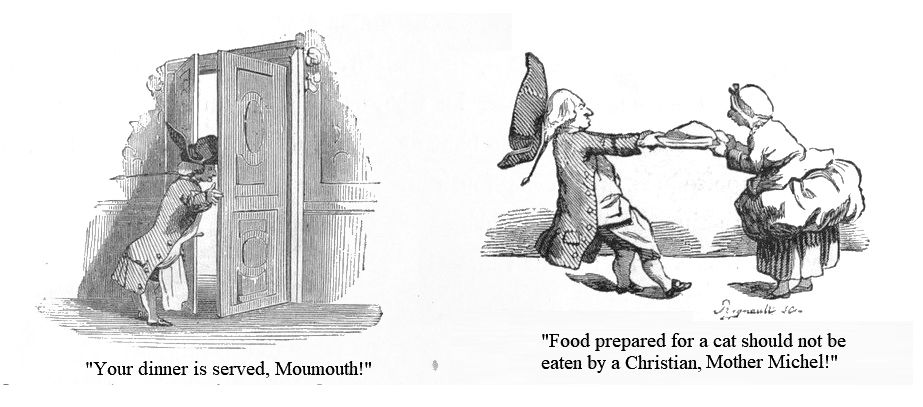
Mother Michel accepted this reasoning, and said with a sort of brusqueness, "Well, let Moumouth make things right! I don't want to give in to all his fantasies, and I won't give him anything else!"
The next day, the mash was still untouched. The butler had hoped that, driven by hunger, the cat would pounce on the poisoned food, but Moumouth knew how to suffer, he could tolerate abstinence and he lived on scraps and crusts of dry bread, recoiling in terror every time his guardian presented him with the fatal dish, which finally remained forgotten in the corner of the cupboard in the anteroom.
Father Lustucru, seeing that his plot had not succeeded, was more irritated than ever. The desire to get rid of Moumouth became a fixation, a passion, an obsession; he dreamed of it day and night. Each letter in which Madame Frogpond asked for news of the cat and reiterated to Mother Michel the promise of a reward, each expression of interest given by the Duchess to her two proteges, spurred the blind fury of their enemy. He concocted the most infernal machinations to destroy Moumouth without compromising himself, but none of them seemed safe enough or expeditious enough. Finally he arrived at this one:
In Mother Michel's room, on a heavy pedestal, on there was a marble bust of Louis XIV, represented with a Roman breastplate and a wig intertwined with laurels. Behind this bust was a bull's eye window overlooking the staircase, and just below this was the soft cushion that served as a bed for Moumouth, whom the fall of the bust infallibly knock out, should the bust decide to fall of its own accord.
One evening, Lustucru slipped noiselessly into Mother Michel's room, opened the bull's-eye window, taking care to leave it ajar, and withdrew silently. At midnight, when everyone in the house was resting, he took one of those long brooms commonly called a wolf's head or ceiling mop; he positioned himself on the staircase, opposite the bull's eye, leaned his back firmly against the banister, and with the help of the ceiling mop he pushed the bust, which fell onto the cushion with a terrible crash. The wicked man had foreseen this effect of his manoeuvre; it was his signal of triumph and the death of Moumouth. However, hearing the bust rolling dully on the floor, he experienced sudden, terrible panic, and returned to his room on trembling legs.
Mother Michel woke up with a start; everything was in complete darkness and she could not strike a light because German chemical matches had not been invented back then. For a moment, surprise and fear deprived her of her faculties, then she shouted: "Beware! Thieves!" at the top of her lungs. Soon the whole house was on its feet and all the servants came running to find out what was going on. Lustucru arrived last, a cotton night-cap on his head, and wearing the most simple attire.
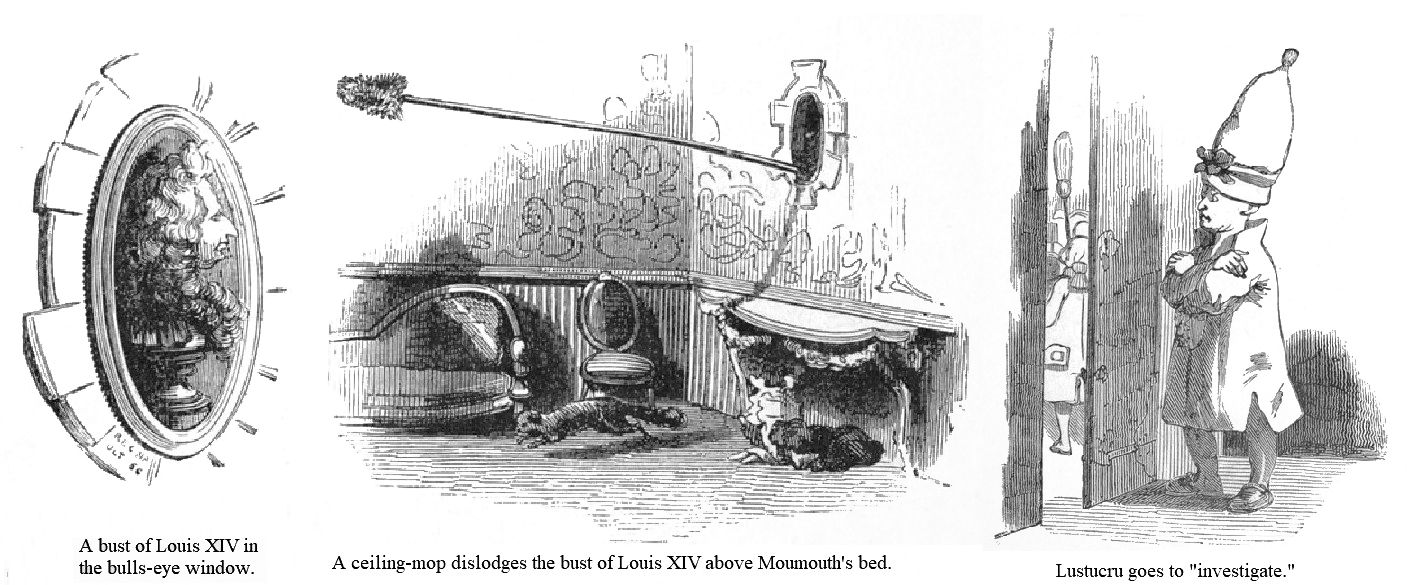
"So, what has happened?" he asked.
"I see it now," replied the lady-in-waiting, "the bust of Louis XIV has fallen down."
"Ah well!" said Father Lustucru, pretending to be astonished, "but, if that's the case, it must have fallen on your cat's head!"
But as he said these words, Moumouth came out from under the bed and rushed to Mother Michel as if to ask her for help and protection. Lustacru remained dismayed.
We know that cats are light sleepers; Moumouth, who was already used to sleeping with only one eye open, got up abruptly when he heard someone moving around on the other side of the bull's-eye window. Like most animals, he was curious. He wanted to know what surprised him, so he had settled in the middle of the room to better observe why a ceiling mop was advancing at this ungodly hour and by this unusual route. Frightened by the falling bust, he had sought refuge at the bottom of the alcove.
Mother Michel was given a glass of water sweetened with orange blossom to restore her senses, then they picked up the great king, who had broken his nose and chin, and had lost half of his beautiful wig in the fight. Then everyone went back to bed.
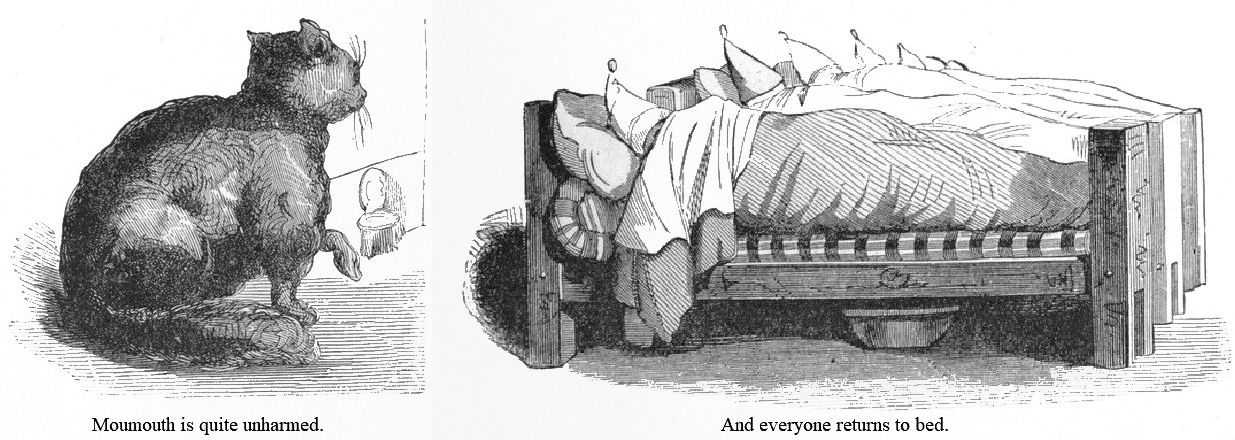
"Saved again!" muttered Father Lustucru to himself. "It seems he will always elude me! Which means I won't be able to send it to join its forefathers before the Duchess returns! Mother Michel will get her pension of fifteen hundred pounds, while I will remain a poor man as before! That feline scoundrel is wary of me - everything I undertake on my own will fail against him. I will definitely need an accomplice!"
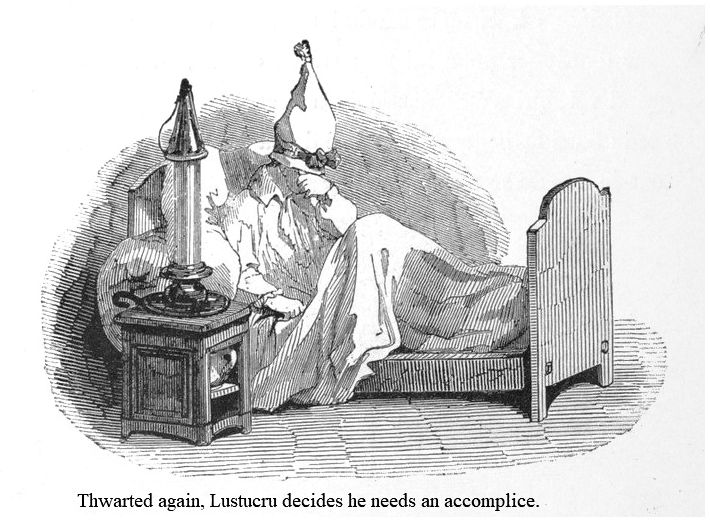
CHAPTER VI - HOW FATHER LUSTUCRU ENTRUSTED HIS ODIOUS PROJECTS TO NICHOLAS POPPYCOCK.
Having come to that decision, Father Lustucru went to look for an accomplice. At first, he considered recruiting someone from among the servants of the house, but he knew that everyone was devoted to Mother Michel, that they would be willing to denounce him and he would be shamefully kicked out of the mansion where he occupied such an honourable and lucrative position. Yet he needed an accomplice. From social class, what age, what sex, and under what conditions should he choose one? Preoccupied by these ideas, Lustucru went out one morning, around twenty-five minutes past six, to go for a walk on the quay.
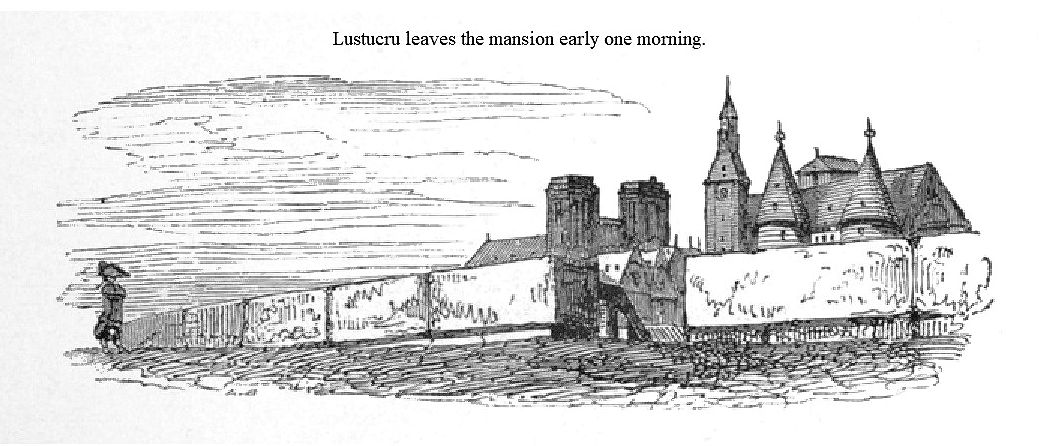
After crossing the threshold, he noticed a tall woman, dry, angular, dressed in bright and discordant colours on the other side of the street. The woman had hollow eyes, a brassy yellow complexion, a nose like a bird of prey, all set in a face wrinkled like an old pippin apple. She was chatting with a boy of about fourteen, dressed in rags, but with an alert and intelligent expression. Father Lustucru thought he recognized the strange old woman, but couldn't remember where he had seen her. Had he been less caught up in his own thoughts, he would have delved deeper into his memories, but the idea of getting rid of the cat absorbed him entirely, and he continued on his way with a worried air, his forehead bent over, his arms crossed on his chest, his eyes fixed on the ground, as if this would bring out the accomplice he needed. He wandered like this for some time. The morning breeze could not cool his blood heated by evil passions. The sight of a pure sky and the song of the birds playing on the riverbanks could not awaken in him the calm and sweet emotions which they inspire in righteous people at dawn.
By the time he returned, the old woman was no longer there, but her young interlocutor remained in the same place sitting on a bollard, his nose in the air as he contemplated Frogpond Mansionl with rapt attention. Lustucru approached him, and addressed him in these terms: "What are you doing here, my boy?"
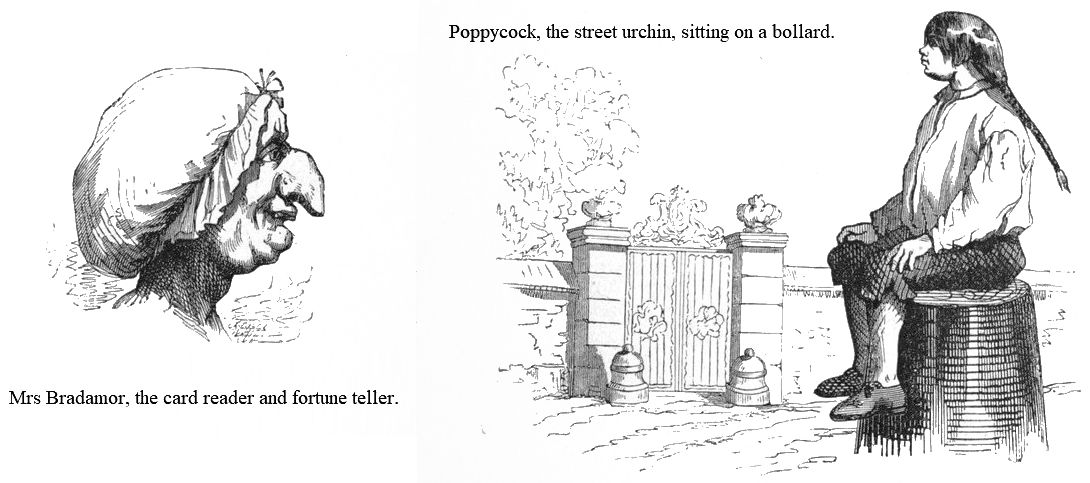
"Me? Nothing. I'm just looking at this house."
"I can believe that without difficulty, but why are you looking at it?"
"Because I find it beautiful and I would like to stay there. The people there must be happy!"
"Indeed, yes," replied the butler emphatically, "we have pretty good days there. Who was that woman you were chatting with just now?"
"That was Mrs. Bradamor."
"Mrs. Bradamor the famous card reader who lives over there, at the other end of the street?"
"That's right."
"You know her?"
"A little. I sometimes do errands for her."
"Ah! ah!. And what did the old witch tell you?"
"She told me that, if I could enter the Mansion Frogpond as a servant, I would have a pleasant existence."
"Madame Frogpond is away right now, my young friend, and besides, her household is complete."
"What a pity!" the young boy continued, letting out a deep sigh.
Father Lustucru took a few steps as if to return to the mansion, placed his hand on the door knocker, then turned around and suddenly turned back to the boy: "What's your name?"
"Nicholas Langlume, like my father; but I am more generally known by the nickname Poppycock."
"How do you make your living? "
"I don't have a job. My father works at the port, and I live from day to day, earning my bread as best I can. I run errands; I sell beetles, blackbirds and sparrows; I collect nails from the streams which I sell at the docks as scrap metal; I open the doors of local carriages; I fish for logs in the Seine; I sing verses on the Pont-Neuf; I light lanterns at the king's feast, and I sometimes play monsters at Monsieur Nicolet's theatre. All these jobs, sir, are not worth a single good one, and I have a hard time eating every day."
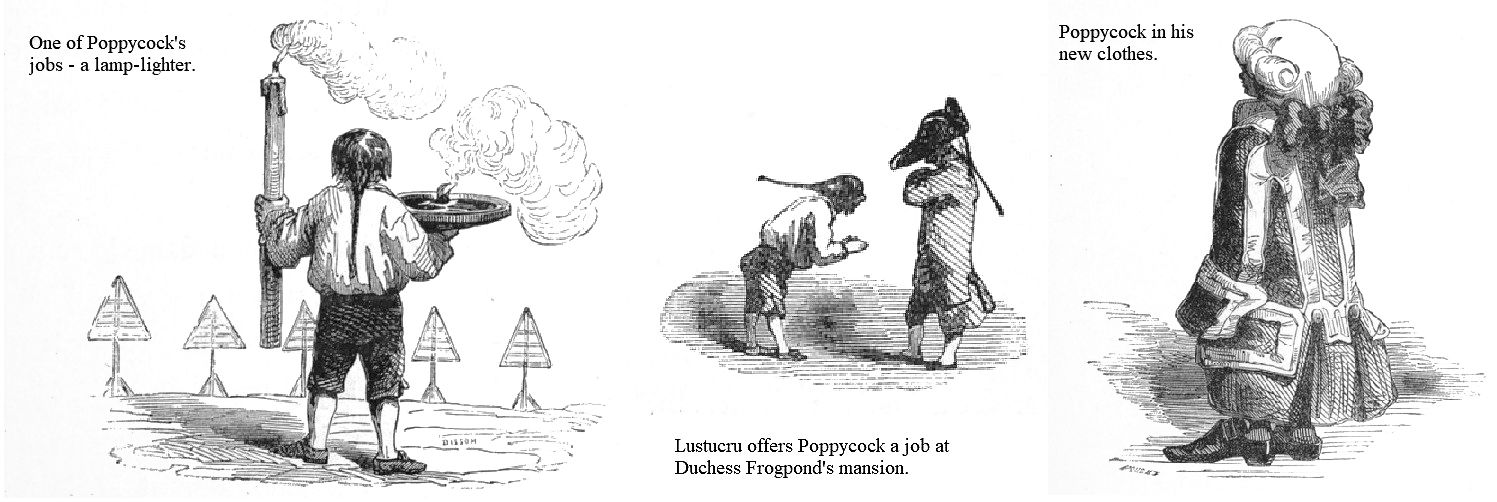
"You interest me," replied Father Lustucru, "and I really want to give you a position in the world. Tell me, Poppycock, do you have a taste for cooking?"
"Absolutely! I like good cooking, but my means do not allow me..."
"I'm not asking you if you're greedy, you fool, I'm asking if you have any inclination to cook?"
"I don't know, I've never tried."
"Well, Poppycock, I will give you lessons. Follow me. I will equip you and maintain you at my expense until Madame Frogpond arrives. She is a good woman and will undoubtedly keep you, but even if not, your education will have begun and you will be able to place yourself elsewhere."
"So you are from the Duchess's household?"
"I am her butler!" said Father Lustucru proudly.
Poppycock's eyes sparkled with pleasure; he bowed respectfully before the butler, and said to him effusively: "I am very grateful to you!"
Poppycock was installed the same day, and cordially accepted by the other servants of the house. He was a good-natured, helpful, alert boy, and, although he was clumsy under his new clothes and in his new functions, he showed a lot of good will.
"Poppycock," said the butler to his protege a few days later, "it is good to teach you the ways of the household. There is here an all-powerful individual who reigns as sovereign master, whose wishes are followed, whose whims are anticipated, and this individual is a cat. If you want to please everyone, you must try to please the Moumouth the cat. If Moumouth grants you his affection, you will in turn have those of Duchess Frogpond and her lady-in-waiting, Mother Michel.
"The cat will be my friend, and I will be the cat's friend," replied the young fellow with confidence.

In fact, he lavished so much attention on Moumouth, so many caresses, and such good services that the latter, although naturally suspicious, developed a strong attachment to Poppycock; he followed him with pleasure, annoyed him, invited him with his lively frolics to play with him. Mother Michel was almost jealous of the little boy; Father Lustucru, who had his own ideas, laughed under his breath and rubbed his hands.
One evening, Lustucru called Poppycock to his room, where he carefully closed the door after making sure that no one was listening. "Moumouth is your friend," he said to him; You have followed my recommendations perfectly."
"I'll stay attached to the house, won't I?" asked the child.
"Probably. You are happy here?"
"Without a shadow of a doubt! I used to live on black bread - now I eat four good meals a day. I had a dirty shirt full of holes and patched breeches, but now I am dressed like a prince. I no longer suffer from the cold, and instead of sleeping under the stars, I fall asleep each night in an excellent bed, where I dream of gingerbread and frangipane cakes."
Father Lustucru rested his chin on the palm of his right hand, and fixed his piercing eyes on Poppycock, saying to him: "And if you had to return to the wandering life from which I took you away?"
"I think I would die of despair!"
"So you would do anything to maintain your current position?"
"I will do anything."
"Anything?"
"Absolutely anything."
"Well, here is what I order you to do. Moumouth follows you willingly; tomorrow you will lure him into the garden at nightfall, you will put it in a bag that I have made especially, you will tighten the strings of the bag...".
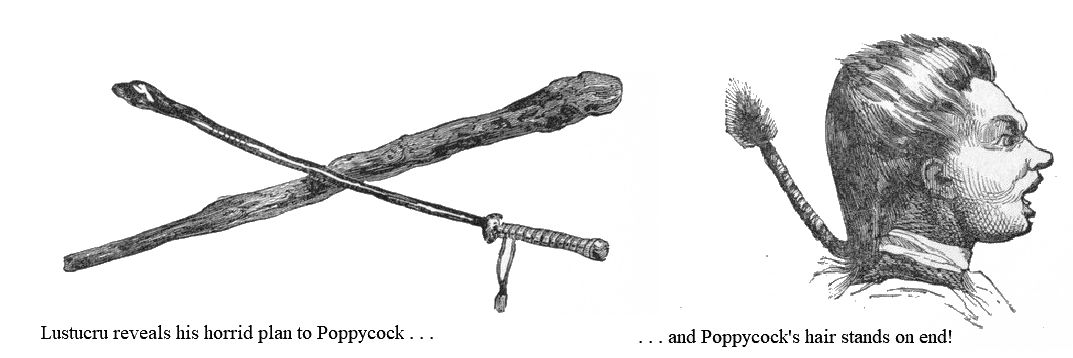
"And then?" said Poppycock, who opened his eyes wide.
"We will each arm ourselves with a stick, and we will hit the bag until he is dead."
"Never! Never!" cried the poor boy, his hair bristling with terror.
"Then pack up quickly and go - I'm throwing you out!"
"You are throwing me out!" replied young Poppycock, raising his hands to the sky in despair.
"You've got just five minutes to get out. You depend on me for your position here, on me alone!"
The unfortunate Poppycock began to cry, and the butler added in fierce tones: "Come on, no grimaces! Take off your clothes, pick up your rags, and disappear."
After saying these words, Lustucru took from a wardrobe the miserable clothes that Poppycock had worn on the day he had arrived, grabbing them disdainfully between thumb and forefinger, and throwing them on the floor. The child gave a desolate look at the clothes with which he was covered, comparing them to the ones he had to change into, and the comparison not being in favour of his old clothes, he uttered heartbreaking sobs. However, he was determined not to buy his beautiful finery at the price of murder and horrible perfidy. He resolutely took off his jacket, then his waistcoat, but at the idea of giving up his new shoes and walking barefoot, as before, on paths strewn with gravel and broken glass, the unfortunate Poppycock had a moment of hesitation, and Father Lustucru, who was watching him carefully, took advantage of that moment like a consummate diplomat.
"Idiot," he said, "you're refusing happiness when it would be so easy for you to keep it. If I was proposing to kill a man, I would understand; I would even approve of your scruples, But it's just the life of a cat, of a simple cat! What do you find so terrible about that? What is a cat? Nothing, less than nothing; we don't attach the slightest value to the lives of cats: innkeepers feed them to their patrons, the most famous doctors massacre hundreds of them in their experiments. We have such little regard for cats that when a mother gives birth to seven or eight kittens, only one is kept, and the rest are thrown into the river."
"But Moumouth is grand, Moumouth is clever," said Poppycock in a plaintive tone; "and, don't you know it, I love him."
" You love him! You dare to love him!" cried the butler with inexpressible rage; "Well, I hate him, I want him to die!""
"But what has he done to you?"
"What do you care? I want him to die? that is all."
"Have mercy on him!" said Poppycock, throwing himself at the feet of the implacable Lustucru.
"No mercy!" hissed Lustucru through clenched teeth. "Nor any mercy for you! Go! Get out! Leave this instant! It's raining cats and dogs and you'll be soaked, you'll die of cold tonight... so much the better!"
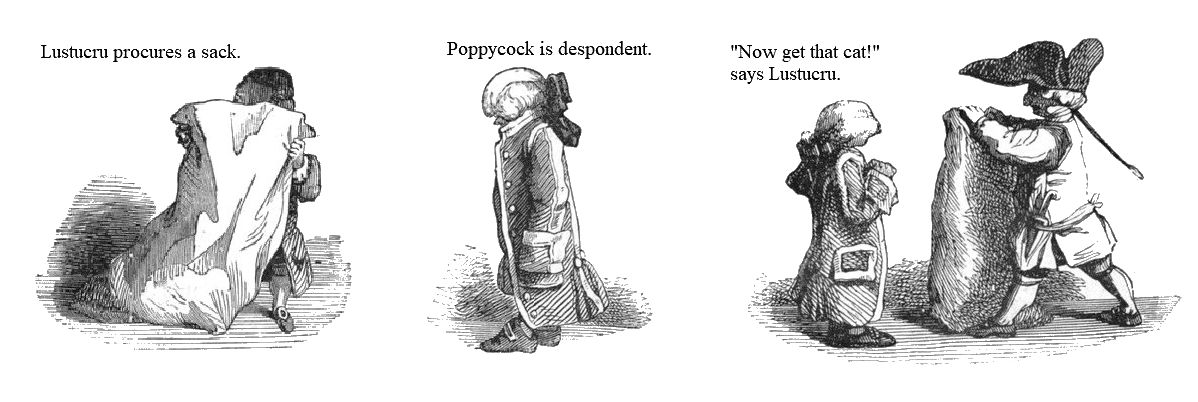
Heavy rain, mixed with hailstones, lashed the windows of the room, and the wind rushed with a mournful howl into the long corridors of the mansion. Then poor Poppycock thought of the cold which would seize him, of the privations which awaited him, of the meagreness of his resources, of the immensity of his appetite and the inconvenience of sleeping on the wet shores of the Seine. The evil demon on his shoulder whispered in his ear these words from Father Lustucru: "What is a cat?"
"Mister Lustucru," he said, crying, "don't send me away, I will do whatever you want."
"Tomorrow, at nightfall, will you lure Moumouth into the garden?"
"Yes, Mr. Lustucru."
"Will you put it in this bag?"
"Yes, Mr. Lustucru."
"And you will beat it with me?"
The answer to this question took a long time to come. Poppycock turned pale and his legs gave way under him, but finally he bowed his head, letting his arms hang alongside his body, as if he had bowed under the weight of his destiny, and murmured in a faint voice: "Yes, Mr. Lustucru."
CHAPTER VII - WHERE FATHER LUSTUCRU IS AT THE HEIGHT OF HIS WISHES AND MOTHER MICHEL'S CAT IS IN AN UNFORTUNATE POSITION.
Lustucru had fixed the next day for Moumouth's final execution, because he knew that Mother Michel had to take the savings she had put aside for her sister to the couriers that day. Throughout the day, Poppycock was plunged into gloomy despondency, and when the fatal hour had struck, his uncertainties of the day before assailed him. When Mother Michel, before going out, said to him: "I'm entrusting Moumouth to you. You'll take care of him, and you'll play with him so that he doesn't get too bored in my absence," the brave boy felt his heart fail and his natural loyalty revolted.
"Come on, we don't have a minute to lose," Father Lustucru said to him. "Here's the sack, go and get the beast!"
Poppycock again implored the butler for mercy; he was eloquent, he had tears in his voice, he delivered a most pathetic plea, but he was not able to change Lustucru's mind. The executioner was unshakeable: he renewed his threats, he demanded the death of the cat, and Poppycock, won over by the evil demon, found himself forced to obey.
Moumouth let himself be led into the garden; he followed his perfidious friend with the confidence of the sheep that follows the butcher, and, at the moment when he least expected it, he found himself enclosed in the sack which was to be his tomb. Lustucru, who had been hiding, suddenly appeared carrying two enormous clubs. He offered one to his accomplice, and grabbed the bag, saying: "Let's get to work, and show no mercy!"
Poppycock did not hear him; he was stunned. His haggard eyes rolled in their sockets; his face was livid, his mouth agape and his arms lost all strength. Father Lustucru, animated by the prospect of imminent revenge, did not notice what was happening in the soul of his companion, and after throwing the bag roughly on the ground, he raised his stick and was about to beat it, when the little garden door opened.

"Unfortunate setbacks!" he whispered. "Poppycock, go into the arbour - I will see you there soon." And, having approached the person who had just entered, he stopped petrified at the sight of Mother Michel. At first he imagined that she had come back due to vague suspicions, by some instinctive presentiment, but he was reassured when he heard her say:
"I'm having to postpone my journey, because I've just seen Duchess Frogpond's carriage. She's going to make a detour, because of the paving work being carried out in the street, and I was able to beat her by entering through the little door. Come, Lustucru, come quickly to meet our good mistress."
"I'm following you, madam," said the butler, but making a megaphone with his hand, he shouted to Poppycock: "Strike alone!" Keep hitting until the cat stops moving!" and he joined Mother Michel in the large courtyard, where all the servants were already lined up, like a well-disciplined battalion.
Getting out of the carriage, Duchess Frogpond honoured her servants with a look of kindness, embraced her lady-in-waiting with touching familiarity, and asked her for news of Moumouth.
"Your protege is doing wonderfully," said Mother Michel, "he is visibly gaining weight and becoming more beautiful, but we can say, without bending the truth, that his moral qualities still outweigh his physical amenities."
"Poor friend, if he didn't love me, it would be monstrous ingratitude! Ever since our separation I've thought of him constantly. Heaven has taken away from me many beings who were dear to me, but Moumouth will be the consolation of my old days!"
As soon as the Duchess had given the orders required for his arrival, she asked Mother Michel to bring Moumouth to her. She replied: "He will be delighted to see you again. Madam. He's in the garden, in the care of Poppycock, a little young man whom your butler thought it appropriate to admit here; this funny chap and the cat have become close friends."
The lady-in-waiting went to the garden, and found only Poppycock there, sitting on a bench and with a preoccupied air plucking a branch of boxwood that he held in his hand.
"My friend," said the good woman, "The Duchess wants you to bring Moumouth to her."
"Moumouth!" stuttered Poppycock, starting at the name, as if he had been stung by a wasp.
"Yes, Moumouth; I thought he was with you."
"He has just left me; passers-by made a noise in the street which frightened him, and he fled into the arbour."
Mother Michel, after having spent more than half an hour wandering through the garden, returned to say to Duchess Frogpond: "Moumouth is absent, Madame; but don't worry, he has already disappeared once, and we found him in the attic."
"Let's get him! I do not want to wait; I want to see him immediately," replied the Duchess.
Alas, this wish could hardly be fulfilled, if we had to rely on the words exchanged in the shadows by Lustucru and his accomplice.
"Well, did you beat it?" asked Lustucru.
"Yes, Mr. Lustucru, I kept beating it until the cat stopped moving."
"What did you do with his corpse?"
"I threw it in the Seine."
"Was he really dead?
"He wasn't moving anymore."
"Besides, the sack was carefully closed. Justice is done!"
CHAPTER VIII - MOTHER MICHEL SEARCHES FOR HER CAT.
Several days passed in painful waiting; but, like General Marlborough, Moumouth the cat did not return. Duchess Frogpond's despair was true and deep, without cries, without outburst; a grief all the more violent because it was concentrated. She constantly remembered Moumouth's kindness, his good nature, his attachment to her, his superior intelligence. Never had an animal offered him such brilliant qualities; never had one of her previous favourites caused her such bitter regrets. Generous in misfortune, she did not reproach Mother Michel; she sought, on the contrary, to calm this poor woman, who surrendered herself to the pain without reservation. She said to her one evening: "What can you do against an irremediable hurt? the wisdom of man consists of not rebelling against misfortune, but in submitting to the decrees of heaven."
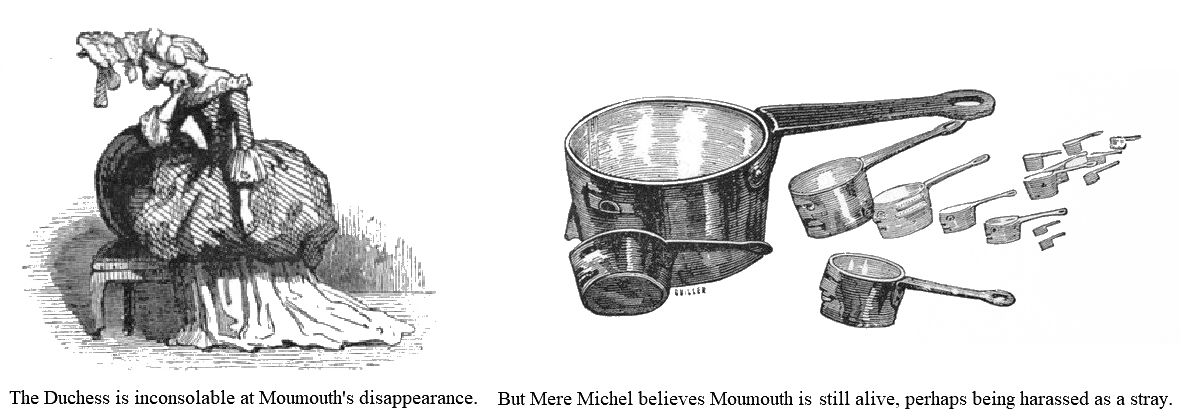
"I agree with you," replied Mother Michel. "If I believed, like you, that Moumouth is dead, I would resign myself without murmuring, but I have the feeling he's still alive. I imagine him wandering through the city, exposed to mistreatment, to the pans perhaps of a frenzied multitude."
"Come on, you are mistaken, Mother Michel; Moumouth must be dead, otherwise he would have come back to us."
"Something tells me that he is still in this world, and if your ladyship wanted news of him, she would only have to contact . . . "
"Contact whom?"
"Our neighbour, Mrs. Bradamor, the famous card reader who predicts the future, removes freckles, reads the book of destinies, and cures toothache.
"Mother Michel! How can you, a sensible woman, have confidence in the trickeries of a schemer!"
"But, Madam, I am not the only one. The greatest lords visit Mrs. Bradamor; she is more learned and less expensive than her companions, and only asks twenty crowns to show you the devil Astaroth."
"Enough, please," replied the Duchess dryly.

Mother Michel was silent; but her mind was made up, and as soon as she had a moment of freedom, she ran to the necromancer's home. Mrs. Bradamor lived in a spacious and richly furnished apartment, because she earned a lot of money deceiving the public. Black velvet hangings, strewn with tinsel stars, lined her consulting room; in the centre, on a square table, stood obelisks of painted tin, Leyden bottles, retorts, and various physical instruments which the so-called witch had no idea how to use, but which she placed there to impress the weak minds of those who came to consult her. At first she appeared embarrassed at the sight of Mother Michel, but after clsoing a glass door which communicated with other rooms, she returned to greet her new client, and said in a solemn tone:
"What do you wish?"
"To question the present, the past and the future."
"I am able to satisfy you," replied Mrs.Bradamor, "but it is a full card reading that you are asking for, and it will cost you three crowns."
"Here they are; I give them to you with all my heart."
Mrs. Bradamor, while regretting not having demanded more, pocketed the money and began with these words:
"What is the month and date of your birth?"
"May 24, 1698."
"What are the first letters of your first name, last name and place of birth?"
"A, R, M, N, L, S."
Madame Michel's name was Anastasie Ravageot; she had been, for twelve years, the widow of François Michel who had been a salted butter tester at the Paris market, and she had been born in Noisy-le-Sec.
"What is your favourite flower?"
"Jerusalem artichoke."
After these usual questions, the soothsayer examined some coffee grounds poured into a saucer, and said: "Phaldarus, the spirit of occult things, tells me that you are searching for someone dear to you."
Mother Michel jumped in surprise on her chair. Mrs. Bradamor added: "This being is not a man; it is a quadruped, a dog or a cat... The celestial Ariel reveals to me that it is a cat."
Mother Michel was more and more satisfied. Without giving her time to recover, the soothsayer took a pack of cards, shuffled them, cut the pack three times and arranged them on the table in symmetrical order, and said gravely:
"Your cat is the jack of clubs; let's see what happens to him. One, two, three, four: ten of spades! He is a runner, he has a mania for travelling, he sets out at night to see the sights of Paris. One, two, three, four: the queen of spades! She is a woman who makes ermine furs from the skin of cats. One, two, three, four: the jack of spades! He's a ragpicker. One, two three, four: the king of spades! He's a restaurateur. The combination of these three people disturbs me. One, two, three, four: clubs! One, two, three, four: more clubs! One, two, three, four: always clubs! Your cat will bring money to these three people: the rag picker wants to kill it to sell the skin to the furrier and the body to the restaurateur, who will offer it to his patrons as a sauteed rabbit. Will the cat be able to escape its persecutors? One, two, three, four: seven of spades! It's over, Madam, your cat no longer exists!"
"They ate everything, the cannibals!" cried Mother Michel, appalled by this revelation, and she thought she heard a plaintive meow, Moumouth's last cry of agony, but it was not an illusion: a cat had meowed and was still meowing in the next room. A pane of the glass door was suddenly shattered, and Moumouth himself fell at the feet of Mother Michel. From the top of a cupboard, he had seen his affectionate guardian and had called to her several times, but when she did not answer him, in his excitement, he rushed against the door, and burst through it.
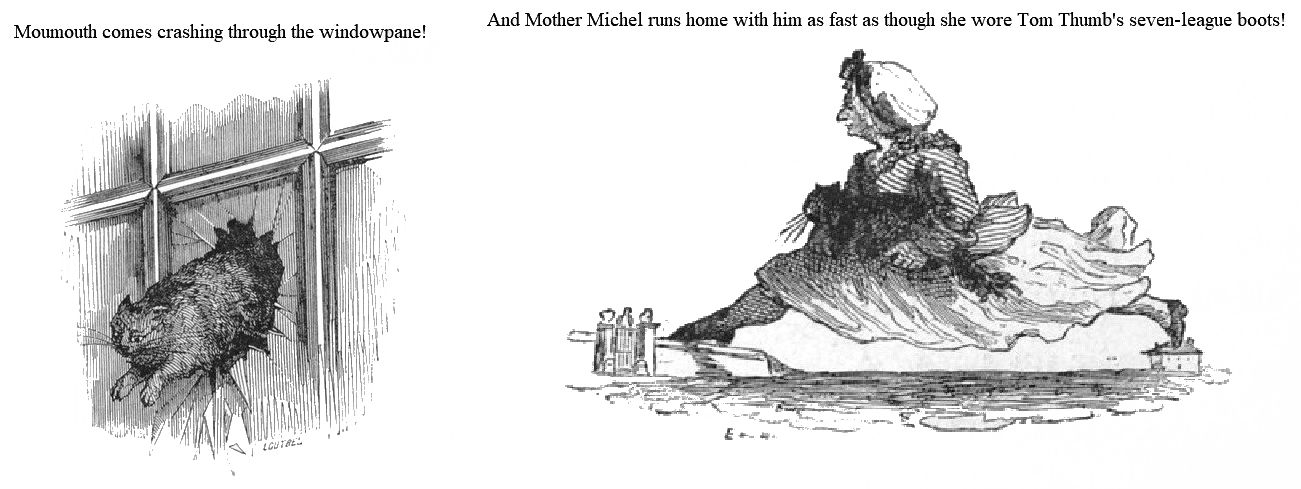
"My cat was at your house!" said Mother Michel, "you stole it! But my mistress is powerful, my mistress is Duchess Yolande Frogpond; she will punish you as you deserve!"
Having uttered these threats, the lady-in-waiting put Moumouth under her arm and prepared to leave. Mrs Bradamor stopped her by saying: "Don't tell on me, I beg you!" I didn't steal your cat!"
"But how come he is at your house?"
"I got him from a little boy named Poppycock; he delivered this cat to me as I had wanted it for a long time, and which, by its bizarre shape, by its somewhat supernatural appearance, could appear advantageously in my cabalistic conjurations. This is the truth, the whole truth; I beg you, don't let your mistress harass me!"
"My lady the Duchess will do as she wishes," replied Mother Michel haughtily, "and she disappeared with her cat. She couldn't have got faster from the Bradamor house to the mansion had she owned Tom Thumb's seven-league boots. She only stopped when she reached the living room, where she arrived panting and unable to utter a single word. She showed Moumouth to Duchess Frogpond who, on recognizing the animal, uttered a cry of joy so resounding that it was heard as far away as the Place du Carrousel.
Lustucru witnessed this touching scene, and at the sight of the cat, he was so stunned that for a moment he lost all reason. He imagined that this cat, saved so many times, was a fantastic being, capable of speaking like the animals in fairy tales, and he said to himself with a shudder: "I'm lost, Moumouth is going to denounce me!"
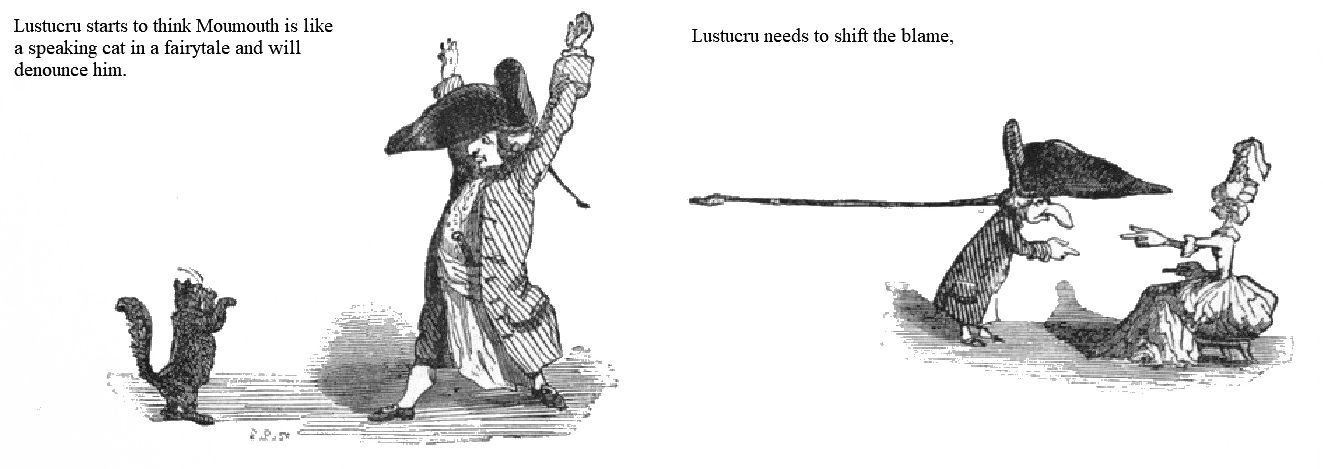
CONCLUSION - SATISFACTION FOR EVERYONE, EXCEPT THE GUILTY PARTY.
As soon as Duchess Frogpond learned how Moumouth had been recovered, she ordered young Poppycock to be brought before her.
"I'll go and get him," said Father Lustucru eagerly, at the same time wanting to warn his accomplice and looking for a pretext to escape.
"No, stay! You brought him into the house, you will see him driven out, and you will learn to place your trust better from now on."
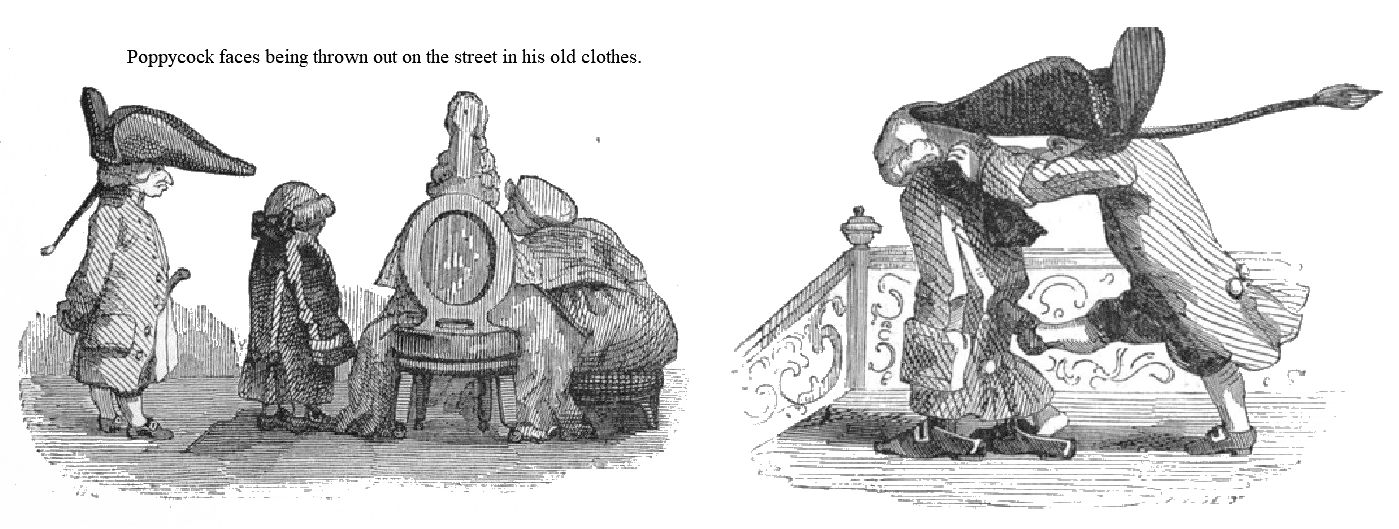
Lustucru remained where he was and, having recovered from his initial stupor, he resolved to brazenly deny everything if Poppycock dared to accuse him.
Brought into the living room, Poppycock faced an interrogation: "Madam Duchess," he said, "the presence of your cat makes me guess why you called me, but I am less guilty than I appear. Allow me to explain."
"What's the point?" replied Duchess Frogpond: "it's impossible to justify your actions."
The butler thought he had to repay the audacity, and said ironically "I would be curious to know what improbable fable this rascal is going to tell you;" and, accentuating these words slowly, he looked at Poppycock with an expression that meant: "If you dare accuse me, woe to you!"
Without allowing the look disconcert him, Poppycock began in these terms, "It must be admitted, Madam, I entered the mansion intending to steal. The card reader wanted him to play the role of the devil Astaroth, and she seduced me with the promise of a crown coin worth six pounds and a pair of clogs. But I was treated so well, and Moumouth seemed so kind to me, that I renounced my guilty plans, I would never, ever, have carried them out had I not understood that it was necessary to remove Moumouth to hide him from the attempts of an enemy all the more terrible because he was hidden."
"Who is he talking about?" asked Lustucru.
"From you! It was you who said to me, "Kill Moumouth, or I will throw you out!"
"I never said such a thing! What an impudent lie! Madam Duchess, you know me well enough not to hesitate between this fellow's declarations and my express denial."
"Poppycock," said the Duchess severely, "what you are saying is serious. Can you provide proof of this?"
"Proof! Alas! no Madam, but I am ready to swear it to you."
"That's enough," interrupted the Duchess, "do not add slander to the theft of the cat, and deliver me from your presence."
Poor Poppycock wanted to protest but, at a sign from Madame Frogpond, Lustucru grabbed him by the arm, threw him out of the room without further ado, and scolded him on the stairs in such a way as to take away the desire to ask for his remainder.
However, the iniquities of the butler were not to remain unpunished for long. That same day, Mother Michel, while putting things away in the cupboard in the anteroom, was very surprised to find three corpses of rats and mice there. She wondered how they had succumbed, when she recognized the famous mash that the cat had refused to eat and that had been left there by mistake. Two mice had died on the plate itself, the poison was so violent and wicked! This discovery tore the veil that covered Lustucru's actions. Mother Michel, guessing that Poppycock's accusations were well-founded, hastened to warn Duchess Frogpond, who recommended silence, and called for the butler.
"Do you still have some rat poison?" she asked him.
"Yes, Madam, I must have a little left."
"We need to put some in the anteroom, if you haven't already done so."
"No, Madam, I didn't know there were any rats in this part of the house."
"That's good, you can withdraw."
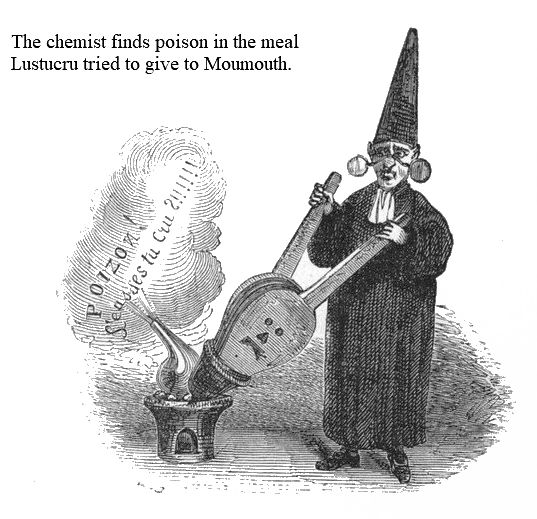
Duchess Frogpond wrote to a famous chemist, who analysed the pate and declared that it contained a prodigious quantity of poison. Lustucru's crime was therefore obvious, but other charges were soon raised against him. The adventure of Mr. Croquemouche and Mr. Guignolet had spread among the sailors; Poppycock learned it from one of them and had discovered a witness who had seen Lustucru throw the cat from the top of Notre-Dame bridge. The butler, confounded, did not wait to be dismissed, but fled at once, and to avoid the vengeance of Duchess Frogpond he embarked as a cook on a merchant ship bound for Australia.
We later learned that this vessel was shipwrecked on the coast of the Sandwich Islands, and that savages had eaten Lustucru. History records that when he was about to expire, he only uttered one word - the name of Moumouth! But what brought this name to the lips of the villain? Was it remorse? Was it just the final outburst of his ruthless hatred? This is what history has neglected to teach us.
Duchess Frogpond's health had suffered through the severe shocks she had experienced when she lost her previous pets. Moumouth's tenderness and graces would perhaps have been enough to keep her going, but that respectable lady had reached an age where sorrows are hardly forgiving. Mother Michel was saddened to find her dead one morning in her bed, her face so serene and bearing the imprint of all her good qualities that one might have believed that she was asleep. She was about to enter her seventy-ninth year.
In her will, which she had deposited with her notary, she had assured Moumouth and her lady-in-waiting an annuity of two thousand pounds, reversible, in the event of the death of one of the legatees, to the last survivor. Mother Michel retired near her sister, whose children she established advantageously, and chose for her retirement a pretty little house located in Bas-Mendon, on the edge of the water, between large green hills.
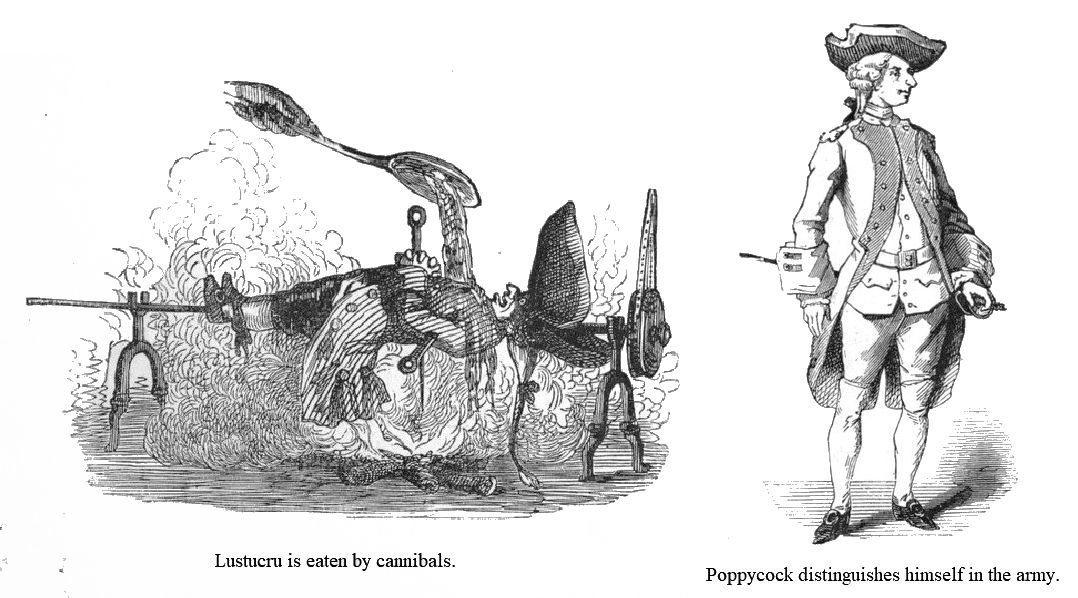
Poppycock, reinstated in the mansion, had made people forget his temporary error through his irreproachable conduct. He could have made his way in the kitchen, but he preferred to serve the State and enlisted at the age of sixteen in an infantry regiment. He took part in the Majorca expedition, under the orders of Marshal Richelieu, and was appointed corporal after the capture of Port-Mahou, on June 29, 1756. When he had obtained his leave, he returned to live with Mother Michel, to whom he had devoted a truly filial affection. The previous ups and downs of their existence were followed by calm and peaceful days, the course of which was embellished by the ever-increasing qualities of Moumouth.
Our cat no longer knew any enemies; on the contrary, he won the esteem and affection of all his fellow citizens. His adventures had made him quite famous. As well as the song, of which unfortunately only two verses survive, the poets of the time wrote a number of quatrains in his honour which have not been passed down to us. It was sung in all languages, including Syriac and Lower Breton. He received visits from the most distinguished men of the time, and from the king himself, who briefly stopped nearby on his way to Bellevue Castle.
A great lady of the court deigned to choose a very sweet and pretty companion for Moumouth, whom he accepted with gratitude. It wasn't long before he became a father, which was the height of his own happiness, and that of Mother Michel, because the excellent woman felt reborn in her cat's posterity.
Perhaps you would like to know what became of Moumouth next? He died! But it was only after a long and happy career. Her eyes, closing, were able to wander with sweet satisfaction over the grieving groups of his children and grandchildren. His mortal remains were not treated like those of common cats. Mother Michel had a magnificent white marble mausoleum built for him. Following a custom then adopted for the burial of all illustrious people, an epitaph composed by a learned professor from the University of Paris was engraved on Moumouth's tomb:
HOC JACET IN TUMULO, MULTIS VIRTUTIBUS INGENS,
ILLUSTRI FELES MOUMOUTH NOMINE NOTUS,
DELICIAE DOMINAE, NECNON MICHAELIS AMORES,
QUAM LUSTUCRUTUS, INFERNIS EJECTUS AB ANTRIS,
FLUCTIBUS, ARSENICO, VOLUIT BACULOQUE NECARE.
AT DEUS OMNIPOTENS SOLIO VIGILABAT AB ALTO.
INSONTIS VINDEX, HOSTEM PROSTRAVIT INIQUUM;
MOUMOUTHUSQUE SIMUL, POST ASPERA FATA TRIUMPHANS,
FELICEM AUSPICIIS VITAM DECURRIT AMOENIS.
SISTE GRADUM, LACRYMAS NEC TU COMPESCE, VIATOR!
EHEU! SEQUANICA FELES REQUIESCIT IN ORA,
INSIGNIS QUONDAM, SED NUNC CINIS ATQUE FAVILLA.
This epitaph being in Latin verse, as learned readers car see for themselves, but we will give an almost literal translation, so that it is not lost on our readers:
Beneath its funeral vault this monument contains
The illustrious cat Moumouth, most justly famed,
Who suffered evil from infernal Lustucru
Vomited from Hades, perfidious things to do.
Heaven knew how to thwart the machinations
Hatched to destroy Moumouth by that vile villain,
And the cat could rest, at last, at leisure
On cloth of silk and gold wove for his pleasure.
Stop, passers-by, and let your salt tears fall
In silence from your eyes on this stone pall,
On the still remains of this beloved feline pet
Of Mother Michel, whom the villain did torment.
He was a simple cat, but his virtues were sublime,
May he accept the homage of our rhymes!
We exalt him as we do our famous mortals,
In ancient Egypt they would have built him altars.
